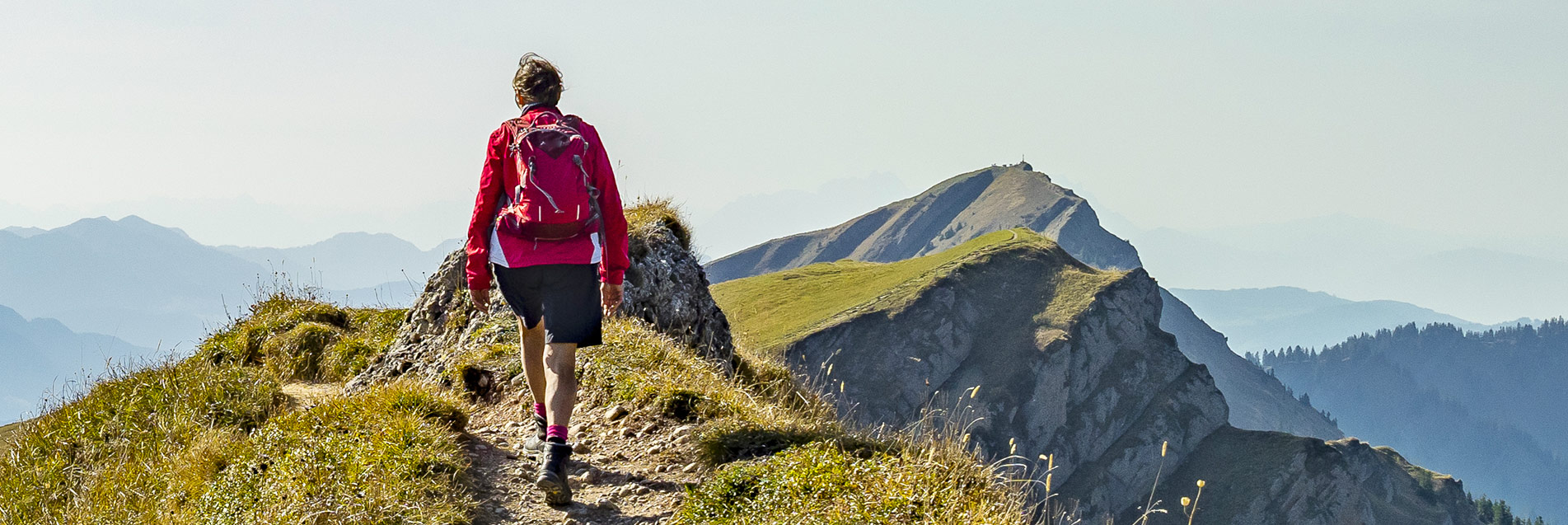Small Group Experiential Travel
Tour Code
mcsp
Start
Apia (APW)
End
Guam (GUM)
Tour type
Max Group Size
16
When To Go
Activity Level
Overnight in
- Overview
- Info & Inclusions
- Itinerary
- Map & Hotels
- Photos
- Reviews
- Extend
- Dates & Prices
Price Includes
- Full-time Tour Leader plus local guides at various locations.
- Breakfast and dinner or lunch daily (hotels and local restaurants).
- All accommodation, transport, sightseeing and entrance fees for sites noted as 'visited' in the detailed itinerary.
- Gratuities for local guides, drivers, restaurant staff, porters. Airport transfers for land & air customers.
- Please Note: Tour cost also includes ALL internal flight costs. Be advised that the taxes on these flights (which we list separately) are rather high at approximately US$700.
- PLEASE take the map on this page with a grain of salt. The sequence of islands featured on this program tends to shift often owing to infrequent and ever-changing air schedules. As such, the map should be used for general guidance only.
Exclusions
- International airfare to/from the tour.
- Tour Leader gratuity, lunches, drinks, personal items (phone, laundry, etc), locally paid departure taxes, domestic and international air taxes (if applicable).
- Any optional activities not listed as part of the itinerary (ie snorkeling/scuba excursions).
- Airport transfers for Land Only customers.
- Optional trip cancellation insurance.
- Any fees associated with entry to any of the countries visited.
- ACTIVITIES: We do not include any snorkeling excursions in our written itinerary, though snorkeling opportunities may present themselves on the odd free afternoon. These will be subject to availability, tidal times, boat and life jacket availability etc. Snorkeling equipment may be available but in limited supply and of possibly dubious quality. Travellers should not expect the snorkeling opportunities to be a guaranteed or frequent presence on the tour. In our experience, the best opportunities are usually limited to Palau, Solomon Islands, Vanuatu, and Tonga.
- Snorkeling aside, multiple swimming opportunities exist throughout and do not present any notable challenges.
Trip Info
- Seasonality and Weather:
As this tour covers a large and diverse piece of geography, special attention has been paid to visiting all of the places covered at, or close to, the best times in terms of weather that one can typically expect. Overall, you can expect warm/hot, tropical conditions throughout. Though our intention is to avoid rainy periods, one can expect tropical showers at any time. - Transport and Travel Conditions:
Land transport is provided by private a/c coaches, the size of which will vary according to ultimate group size and location. Larger touring buses may be used in some locations such as Guam. Due to the more remote locations and limited infrastructure of most islands, we will have smaller vehicles of 16-25 seats, which may sometimes double as the local school bus, so don't expect plush touring coaches. Most inter-island flights will be operated by Air Pacific/Fiji Airways.
We have several boat excursions on this tour, which may require that you be able to step over gunwales into the boat, or sit thereon and swing your legs over.
Please note that many islands visited have very strict rules pertaining to land ownership and usage, such that it may not be possible for us to simply stop to stretch our legs, take photos, or, say, visit a village or beach on a whim. Doing so could invite problems pertaining to "trespassing" or exorbitant charges for simply taking a photograph.
Access to these rarely visited islands is extremely difficult, and restricted by infrequent flight schedules, which can at any time. As such, itinerary modifications may occur close to the departure date or while the tour is in the field. The amount of time spent on each island will therefore be entirely dictated and determined by the available flight schedules at the time of operation of the tour. As a result, the order of islands visited may change, and the number of nights on each island may have to be adjusted -- ie we may lose one night on one island and gain a night on another, or some connection points may be replaced entirely (ie Manila or Nadi). After the trip you may have a sense that you had too much time in one place and not enough time in another. One might also observe that a lot of time is spent in airports and on planes, all necessary aspects of a trip like this. So sit back, relax, and appreciate an astonishing array of places where very few travellers ever set foot.
If we are forced to make material/content changes after your reservation, we will advise you by email. We will not, however, consider such adjustments sufficient reason for you to cancel your trip without penalty.
We rate this tour a "level 2," as, though it is not strenuous per se, this tour is ambitious, covering a huge area and involving many flights, some of which are long and possibly at inconvenient times. On the ground, activities are leisurely and not tremendously active; however, that said, the real consideration is the HEAT and humidity, which can sap your strength and cause fatigue.
IMPORTANT: Vegetarians/vegans and travellers with strict dietary requirements/preferences will encounter considerable challenges on this tour, as your range of non-meat/fish options will be limited. Vegetables (fresh and canned) are available only sporadically depending on the arrival of infrequent supply ships. Those with allergies and severe intolerances should reconsider participation, as these cannot be safely accommodated due to cross contamination and a lack of understanding at these destinations. As such, Adventures Abroad cannot ensure safety or accept responsibility.
A word about TOUR STATUS: While we appreciate that everyone wants to know when their chosen date for this tour will be 'guaranteed,' this tour is a special case in that our reaching minimum numbers is only one small part of the process. This tour usually sells out well in advance, but we often hold off on confirming final dates and itinerary until we have confirmed ALL arrangements at destination, including internal flights. This tour sometimes has to run in a different order, which could affect overall dates and tour start/end points. We will only confirm once such details are finalized.
PLEASE NOTE: Due to the complicated nature of our South Pacific itineraries, we regret that we are not able to offer custom/private tour services for these trips.
Am I suitable for this tour? Please refer to our self-assessment form - Accommodation:
Our accommodation styles and rating will vary quite widely on this tour; some hotel rooms are well-equipped and will likely include hairdryers, minibar fridge and TV. Other hotels on smaller and less developed islands will be clean and comfy, but may not provide the same amenities. All are air-conditioned. Some hotels provide complimentary purified drinking water or bottles of water. Some bathrooms have shower only. Many hotels have swimming pools.
A mandatory single supplement may apply to this tour if you select our share program and we are unable to pair you. Due to the high cost of single accommodation in the region, the mandatory supplement is 100% of the regular supplement. - Activity Level: 2
These are particularly busy tours that feature a lot of moving around, sometimes by train and short journeys on local transport. Walking tours of towns and cities are leisurely but you should be prepared to be on your feet for several hours. Some of our cultural trips that occur at high altitude and/or require greater independence with baggage handling (at hotels, airports, train stations) also fall into this category.
To learn more about the Activity levels, please visit our tour styles page. - Staff and Support:
Tour Leader throughout; local guides, drivers. - Group Size:
Maximum 14 or 16 plus Tour Leader (depending on availability and/or final rooming configurations)
Download Itinerary
- Day 1:Arrive in Apia, SamoaArrival in Apia, Samoa (airport APW).
Each South Pacific island group has its own history, culture, language, geography, and geology. That is the nature of such a far-flung region, where hundreds or thousands of miles separate one island from the next. On the other hand, the islands have many things in common. Their indigenous peoples are descended from ethnic groups who migrated here several millennia ago. Many of their traditions and customs are the same, but with local quirks that have developed over the eons. Nowhere are the local variations as evident as in the Polynesian languages!
Due to colonial neglect and historical isolation, the Pacific Islands, home to the world's most diverse range of indigenous cultures, continue to sustain many ancestral ways of life. Fewer than 6.5 million in all, the peoples of Oceania possess a vast repository of cultural traditions and ecological adaptations.
Oceania is a vast, arbitrarily defined expanse of the world where the Pacific Ocean -- rather than land borders -- connects the nations. Its diverse nations have some of the worlds most remote and culturally isolated villages. One of the most memorable aspects of our travels to the South Pacific will be the fascinating encounters we will have with the cultures and traditions of the people in this beautiful region. In this part of the world, ancient cultures are still very much alive and are accessible for visitors to discover.
** Some itinerary modifications may occur closer to the departure date due to flight routing and schedule changes. Access to most islands is restricted by flight schedules (sometimes just 1-2 flights per week). This may, of course, impact the itinerary. The order of islands visited may change, and the number of nights on each island may have to be adjusted; ie we may lose 1 night on one island and gain a night on the other.
Overnight in Apia, Samoa.
Included Meal(s): Dinner - Day 2:Samoa: Island TouringThe entire country of Samoa serves as a cultural storehouse of fa'a Samoa, the traditional Samoan way of life. Most Samoans still live in villages featuring fales (oval houses), some of which have stood for centuries (though tin roofs have replaced thatch). The island of Savai'i is especially well-preserved, and today much of Apia on the island of Upolu looks like it did when Robert Louis Stevenson settled here in 1889.
Our touring today covers Mulinu'u, the sacred burial grounds of the chiefly families of Samoa; Parliament House, Independence Monument, Lands & Titles Court, German Monument (where the German flag was raised) and the landing site of the first Catholic Missionary to Samoa. A stop at the impressive Mulivai Cathedral in Apia to view exquisite stained glass windows and an architectural marriage of European & Traditional Samoan Designs followed by a visit at the Robert Louis Stevenson’s former home which is now a museum, a "must" visit of artifacts, books, and settings around the time he was residing in Samoa.
Overnight in Apia, Samoa.
Included Meal(s): Breakfast, Lunch and Dinner - Day 3:Samoa: Savai'i Island TouringToday will be spent exploring Savai'i, the largest island of Samoa. Savai'i is one of the largest of all Polynesian islands, and this great volcanic shield is also one of the least populated. Here we will find traditional villages with oval-shaped houses sitting alongside freshwater bathing pools fed by underground springs. Savaii is relatively undeveloped and regarded by many as the "real" Samoa.
For our sightseeing we will depart from our hotel early in the morning and head for Mulifanua wharf in order to connect with the morning ferry to Savai'i. The crossing takes about 90-minutes, and will provide us with some great views of the Samoan islands. Upon arrival we will be met at the wharf and proceed with our island touring. At Savaii's fresh produce market we can view the locally grown produce and handicrafts.
We later head back to the wharf for our return journey.
Overnight in Apia, Samoa.
Included Meal(s): Breakfast, Lunch and Dinner - Day 4:Samoa: Manono Island TouringOur tour today will visit Manono Island, which offers an insight into Samoan culture and life. An hour's drive to the west and then a further 20-minutes by boat brings us to Manono Island. The boat leaves from Cape Lefatu, with views of the crater island of Apolima along the way. Once reaching Manono we will be greeted by our Samoan hosts for a brief lecture on Samoan customs and etiquette. We will have the chance to learn about locally grown products, as well as the various local uses of the coconut.
This island is completely enclosed by a reef, and the colours of the crystal clear water are simply stunning. Today there are only four villages on the island with a total population of 889. Electricity was only introduced here in 1995.
This is the third largest island of Samoa, but has an area of only three-square kilometres and was in years gone by, the most important of the group of islands in a political sense, for it was here that the highest chiefs lived. In Manono there is a very Samoan atmosphere, no noise, no dogs, no vehicles, and the main thoroughfare is a footpath that follows the coast. We will enjoy a magnificent stroll viewing the lush beautiful gardens with cooling tradewinds.
This is a real paradise for anyone looking for adventure, friendly people and an island that has hardly changed in the last 100 years. Life is very different than elsewhere. The men go to the coral reef spear-fishing every morning on their traditional canoes and come back only once they catch enough fish to feed the family.
Overnight in Apia, Samoa.
Included Meal(s): Breakfast, Lunch and Dinner - Day 5:Samoa: Aleipata Districts & East CoastWe continue on a scenic drive via the Cross Island Road passing the Baha’i Temple, mountains, and rainforest until we reach the most Southern Point of the island. The South East coast of Upolu is a drive through villages until we arrive at the Lalamanu Beach where we will stop for a scrumptious BBQ and Umu Feast lunch with fresh local fruits in season.
Sopo’aga Falls and mini Botanical Gardens is our next stop where a demonstration of the many uses of the coconut and coconut cream making is done. Le Mafa Pass (1,700ft above sea level) has breathtaking views of the east and south coastlines. The scenic drive takes us through lush green forests, plantations, and traditional Samoan villages. Continuing on, we will stop at Falefa village with it’s colourful gardens, ideal for a stretch and photo stop.
Overnight in Apia.
Included Meal(s): Breakfast and Lunch - Day 6:Apia, Samoa - Fly to Nuku'alofa, Tonga (Via Fiji)After breakfast today we will have some leisure time, before then transferring to the airport early this afternoon for our flight to Tonga (via Nadi, Fiji)*.
* If you're wondering why we don't spend more time in Fiji, we have found in the past that time here was not considered a highlight by past travelers. That, plus the fact that the 'thrust' or theme of this tour is toward the more unknown obscure islands, is why we do not emphasize Fiji in our promotion of the tour or regard it as worthy of more time than we already give it. More than anything, it provides an important connection point for tying this complicated tour together!
Overnight in Nuku'alofa.
Included Meal(s): Breakfast and Lunch - Day 7:Tonga TouringThe Kingdom of Tonga is a sovereign state and archipelago comprising 176 islands scattered in the southern Pacific Ocean. Of these islands only 52 of are inhabited. Tonga became known as the 'Friendly Islands' due to the friendly reception accorded to Captain James Cook on his first visit here in 1773. This is one of the last absolute monarchies in the world where social rule is based upon a feudal system where the king disburses land and positions without recourse to any elected body.
Today we visit the 'Ancient Tonga' village at Fangaloto, where we will learn about the fascinating myth of the coconut and observe the traditional methods of obtaining coconut milk. Discover the secrets of baking Tongan food in an earth oven and enjoy performance of local song and dance and discover the intricacies of tapa cloth making, mat weaving and wood carving. We'll also stop at a local market and enjoy a traditional "umu" lunch today.
Overnight in Nuku'alofa.
Included Meal(s): Breakfast, Lunch and Dinner - Day 8:Tonga: Tongatapu Island TouringToday will be spent touring the island of Tongatapu, Tonga's largest island with over two-thirds of the country's small population. We will start by touring Nuku'alofa, situated on the north coast of Tongatapu, and our time here provides us with a great opportunity to experience this unique culture.
A field to the west of the main wharf is the Pangai, where royal feasts, kava ceremonies, and parades are held. The Royal Palace overlooks the Pangai and is surrounded by towering Norfolk pines. During our touring we will be sure to see the Royal Tombs. King George I, King George II, Queen Salote, King Taufa'hau Tupou IV are buried at the center of the field.
Outside of the capital, at the village of Mu'a, we will stop at the monument marking Captain Cook's Landing Place. The great British explorer landed and rested under a large banyan tree here when he came ashore in 1777 to meet with reigning Tui Tonga.
One the most prominent sites on Tongatapu is the Ha'amonga Trilithon, located on the eastern tip of Tongatapu Island. This is the area where the eleventh Tongan King had his seat of power, and it is believed that Tu'i Tu’itatui built the structure in 1200 AD. The Ha'amonga 'a Maui has been scientifically interpreted as an early style sundial clock that recorded different seasonal changes. Nearby is Maka Fa'akinanga ('Leaning against the rock'). Made from the same stone as the Ha'amonga, the Maka Fa'akinanga is a large stone slab standing upright with markings on the front resembling an indentation of a large head, shoulders and back. Oral stories recount the belief that Tu'i Tu'itatui (eleventh Tu'i Tonga) often sat against the Maka Fa'akinanga and struck out with a staff at people so that they were kept at a safe distance for fear that they may make an assassination attempt.
The small fishing village of Nukuleka on the northeast coast is possibly the site of first human settlement in Tonga. In 2008, Canadian archaeologist Professor David V. Burley claimed that it was the "cradle of Polynesia". In 2007, Burley led an archeological team, and uncovered pieces of Lapita pottery; which are estimated to be about 2,900 years old. Burley then stated: "Tonga was the first group of islands in Polynesia to be settled by the Lapita People about 3,000 years ago, and Nukuleka was their first settlement in Tonga." This finding challenged claims made by Samoa which, in the words of a New Zealand journalist, "has advertised itself for decades as the 'cradle of Polynesia'".
The majestic blowholes of Pupu'a Puhi, located along the rugged coast near the village of Houma, provide a never ceasing display of the power of the sea. Here the power of the Pacific Ocean is forced through natural rock fissures to create instant skyscrapers of water up to 30-meters high. As the southerly winds blow into Tongatapu the sea is driven into the southern coastline and sea spray erupts into the air. As we proceed towards the village of Kolovai on the western tip of the island we will keep an eye out for the flying foxes in the treetops. Our last stop of the day will be at the Abel Tasman landing site.
At some point during our time in Tonga, we hope to visit Anahulu Caves. We'll spend about a half-hour in an illuminated cave (with a low-headroom entry) whuch opens up to amazing stalactites and stalagmites and a beautiful cave pool.
Overnight in Nuku'alofa.
Included Meal(s): Breakfast and Lunch - Day 9:Tonga: Fly to Port Vila, Vanuatu (Via Fiji)Early this morning we will transfer to the airport for our flight to Vanuatu via Fiji.
With a population of approximately 221,000, Vanuatu boasts 113 distinct languages and innumerable dialects. This makes Vanuatu one of the most culturally-diverse countries on earth. This amazing diversity is a result of thousands of years of sporadic immigration from many Pacific countries.
Over the millennia, natural boundaries; large open stretches of water, dense jungle and mountainous terrain, isolated many groups, even from the same ethnic origins, from each other. And isolation bred not just warfare, but quite different, sophisticated societies and political systems.
At some time during our visit, we'll visit the excellent and worthwhile National Museum.
Overnight in Port Vila.
Included Meal(s): Breakfast and Dinner - Day 10:Vanuatu: Round Island TourToday's full-day tour begins with a stop at Pepeyo Village for an amazing cultural experience. Visit and experience traditional practices and skills, and be mesmerized by custom dancing and an amazing fire-walking display.
Next is the Blue Lagoon and Eton village. The water is slightly salty and so blue perhaps from the limestone fresh water springs and the tidal sea water. Try the rope swings into the water. Refreshments included, local organic fruits in season and juices. We also see the huge ancient banyan trees in Pangpang and learn the difference between the male and female trees and their traditional use. We enjoy a buffet lunch.
As we go we'll also learn about WWII in the region and possibly view some relics. We make a stop at Gideon's Landing and visit Vanuatu Survivor Beach and and enjoy afternoon coffee/tea.
PLEASE NOTE: Depending one ever-changing air schedules specific to tomorrow's excursion, we may fly to Tanna Island later today, spend the night there, and then embark on our touring as described on day 11.
Overnight in Port Vila.
Included Meal(s): Breakfast, Lunch and Dinner - Day 11:Vanuatu: Tanna Island / Yassur Volcano ExcursionToday we will enjoy a scenic adventure to one of the world's most accessible active volcanoes! Our Yasur Volcano exploration starts with a scenic one-hour flight to Tanna Island. This journey takes in the spectacular views of Port Vila Harbour, South Efate and Erromango with its beautiful coastline (weather-permitting). On the approach to White Grass Airport in Tanna you will have a great view of the magnificent landscape of Tanna Island.
Here we will be met by our friendly 4WD Safari staff and taken to a local resort for some refreshments. Our Volcano Tour begins with a 4WD journey across the island, passing local villages, dense native bush, stunning views and passing over volcanic ash plains as we approach Yasur Volcano.
Once we reach the summit it is a short 10-minute uphill walk to the rim of the crater, where we will experience the awesome power of the world's most accessible active volcano! This ancient volcano is conspicuously located in one of the most pristine, unspoiled corners of the globe.
The Island of Tanna is a natural paradise and a favourite destination for volcanologists and adventure travellers. In the local native dialect, Yasur means 'Old Man'. This volcano is 361 meters above sea level, and the crater itself is 300 meters wide and 100 meters deep. Visiting Mount Yasur is a 'once in a lifetime' experience, and your opportunity to watch nature at work.
Overnight in Port Vila.
Included Meal(s): Breakfast, Lunch and Dinner - Day 12:Vanuatu: Island Touring - Fly to the Solomon IslandsThis morning we tour the town of Port Vila, the capital and largest town of Vanuatu.
We see the best city sights and take a journey of discovery as we learn about the traditional villages of Port Vila, the chaotic British and French colonial history, and encounter Port Vila life today as we finish the tour at the bustling Central Market and Mahitahi Handicraft Market.
Later today we transfer to the airport for our afternoon flight to the Solomon Islands.
Just 9 degrees south of the equator, the Solomon Islands are comprised of 992 islands, of which 147 are inhabited. These island stretch 900 miles in a southeasterly direction from the Shortland Islands, on the border with Papua New Guinea, to the Santa Cruz Islands, which borders with Vanuatu. The archipelago covers an area of 461,000 sq km -- made up of deeply forested mountainous islands and low-lying coral atolls.
As part of the Melanesian group of islands that also includes Papua New Guinea, Vanuatu, and Fiji, hunters and gatherers from Southeast Asia first settled the Solomon Islands. Seafarers followed later, and it is believed that early Papuan speaking settlers began arriving in the Solomon Islands around 30,000 BC. Austronesian speakers arrived in 4000 BC. Archaeological and linguistic evidence shows that people from Southeast Asia permanently settled the Solomon Islands at this time.
Today, between 70 to 80 percent of the population live a subsistence way of life in their small villages, settlements and islands away from the main urban centres. The number of local languages listed for Solomon Islands is greater than 75. Communal, clan and family ties remain strong in these islands with the existence of the Wantok system. A key part of the Melanesian culture, Wantok means people from the same language groups who are blood relatives and part of the extended family support and assist one another. Traditional practices are still being followed, especially by those living in the interior of the country's larger islands. Off the beaten path, village life remains much as it has been for centuries.
Overnight in Honiara.
Included Meal(s): Breakfast and Dinner - Day 13:Solomon Islands: Cocoa Farm Visit and City TourWe will begin our day by visiting the US Peace War Memorial. With a commanding position, the US Peace War Memorial was constructed in 1992 for the 50th anniversary of the Battle of Guadalcanal. It provides an excellent view of Iron Bottom Sound and the surrounding mountainous regions of Honiara and Guadalcanal.
Later this morning we will continue to the Amazing Grace Cocoa Farm. Here we will have a full tour of the farm, and get the opportunity to learn all about the chocolate making process.
This afternoon we will travel back into Honiara and complete our day of sightseeing with visits to the National Parliament, National Museum, and Art Gallery.
Overnight in Honiara.
Included Meal(s): Breakfast and Dinner - Day 14:Solomon Islands: Central GuadalcanalStepping out from the usual path into the islands of the Solomons is a totally unique and richly rewarding experience. Without doubt, this is one of the few remaining, truly un-spoilt tourist destinations of the world. The following day description should be seen as a guide only, as your Tour Leader and local guide/s will tailor your experience and possibly re-order the activities outlined below as conditions/variables dictate.
This is an island group of rainforests and volcanoes. There are over 900 volcanic islands in the Solomon Islands, and here we will discover the palms, ferns and truly exotic orchids spread across the islands. Certain regions in the Solomon Islands served as battlegrounds during the Second World War. Guadalcanal is known for its many WWII sites, and we will visit several during our day.
Overnight in Honiara.
Included Meal(s): Breakfast and Dinner - Day 15:Solomon Islands / Tulagi Island ExcursionToday we will enjoy a full-day excursion to Tulagi Island in the Florida Islands group (also known as the Nggela Islands). This island group of the Solomon's sits immediately north of Honiara across the renowned Iron Bottom Sound. This will be a full day of discovery as we cruise through one of the few truly untouched areas of the South Pacific. Our boat trip takes us to Tulagi Island, the old capital of the Solomons.
The Florida Group is made up of four large islands: Big Gela (or Nggela Sule), Small Gela (or Nggela Pile), Buena Vista Island, Sandfly Island as well as approximately 50 other surrounding smaller islands. The Japanese garrisoned Nggela Sule in April of 1942 in connection with their efforts to establish a seaplane base on neighboring Gavutu.
Florida Island never became as famous as Guadalcanal, although it did serve as a small, very secondary base of operations for the US and Australian and New Zealand war effort in the Pacific. Following the Allied liberation of the island from the Japanese, it became the site of a US seaplane base. Tulagi (also known as Tulaghi), was the capital of the Solomon Islands Protectorate from 1896 to 1942, and is today the capital of the Central Province.
A visit here is a must visit for the true intrepid traveller, and all of our sightseeing is done on foot. This original capital of the Solomon Islands was severely ravaged during the Second World War, and Honiara became the new capital after the war. Tulagi is in the center and entrance to the Florida Islands. Here one finds small provincial government offices, the police station, post office, main port, market and a few restaurants. Our stop at this colonial capital will include a walking tour, where we experience the true pace of life on an undeveloped island.
In travel terms, these islands are still very much virgin territory, and our adventure today is an experience not to be missed.
Overnight in Honiara.
Included Meal(s): Breakfast, Lunch and Dinner - Day 16:Solomon Islands: West GuadalcanalToday we will continue to explore Guadalcanal, though this time our sightseeing will be focused on the western part of the island. We will spend the morning exploring a number of sites, including the Vouza War memorial and the Botanical Garden in Honiara.
This afternoon you will have some leisure time before we regroup for dinner this evening.
Overnight in Honiara.
Included Meal(s): Breakfast and Dinner - Day 17:Honiara, Solomon Islands - Fly to ManilaToday is a travel day, with a connection in Port Moresby (transit only) and then onwards to Manila, arriving this evening (dinner on board our flight).
The Spanish knew the city of Manila as the jewel of their Pacific Empire, and today Manila is a city that has to be experienced to be understood. Located on the eastern shores of Manila Bay, Manila lay at the heart of Spanish activity in the Far East during the 16th century. Once known as the 'Pearl of the Orient', the city went on to witness several Chinese insurrections, a British occupation and a Sepoy mutiny, a war against the colonial Spanish and some of the bitterest fighting of World War II.
PLEASE NOTE that the order/placement of our Manila sightseeing elements may vary depending on arrival/departure flight times.
Overnight in Manila.
Included Meal(s): Breakfast - Day 18:Manila: Chinatown & the Charms of Old ManilaWe will begin the day with a walking tour in Binondo, Manila's Chinatown. Here we will be spoilt with the choice of many local must-eat delicacies. Then, we will proceed to the Chinese Cemetery, the second oldest cemetery in Manila after La Loma Cemetery. The cemetery includes Christian, Buddhist and Taoist burials. We will also visit the Minor Basilica and Archdiocesan Shrine of the Black Nazarene, popularly known as Quiapo Church.
As we explore the "Charms of Old Manila", we will drive through Roxas Boulevard to Rizal Park, named in honor of the country's national hero, Dr. Jose Rizal. For people-watching there’s no better place than Rizal Park where, every day, locals can be seen jogging, picnicking, or simply hanging out with friends.
At the Walled City of Intramuros we visit the remnants of Spain's conquistadors. We will explore this 'living museum' - the oldest part of the city known as 'between the walls' – the Spanish era walled city. It was here that Miguel Lopez de Legazpi built a fort on the site of a ruined Islamic settlement, with walls 13 meters thick and 3km long. Within this protective enclave, the exclusive preserve of the Spanish ruling elite, were 15 churches and 6 monasteries. The imposing Roman Catholic Cathedral is here, and has been rebuilt countless times. A walk through this area gives us a sense of the true history of this area.
We continue to Fort Santiago, Manila's main line of defense against invaders from the sea. It is a stone fort guarding the entrance to the city from Manila Bay. It has been the site of many tragic moments in Philippine history. Our last stop for today will be Baluarte De San Diego. Located along the walls of Intramuros, Manila, it was designed and built by Jesuit priest Antonio Sedeno from 1586 to 1587 and it is one of the oldest stone fortifications in Intramuros.
Overnight in Manila.
Included Meal(s): Breakfast and Dinner - Day 19:Manila: Chinatown/ New Manila Tour / Fly to PalauToday's touring continues through Makati, the financial Center of the Philippines. We will soon arrive at the American Cemetery and Memorial, located on a large plateau with beautiful and breathtaking views around the city of Manila. The tour then proceeds to Ayala Museum, which includes a showcase of works by family member Fernando Zobel, a prominent artist in his own right. If today (or yesterday) does not fall on a Sunday, we'll visit Casa Manila, a reproduction of a 19th century house equipped with oriental and European décor, as well as Philippine antique furniture. Built by Imelda Marcos, this is a chance to see some stunning antique furniture and artwork.
This evening we head to the airport for our late night flight to Palau.
Overnight in Koror.
Included Meal(s): Breakfast and Dinner - Day 20:Palau: Island TouringThe Palau Islands are an archipelago composed of about 350 islands and atolls having an area of approximately 160 square miles. All of the islands except two small atolls to the north and the islands of Angaur and Peleliu to the southwest are enclosed within the barrier or fringing reef. These islands are located at a crossroads where the Pacific Ocean meets the Philippine Sea, creating one of the worlds' richest zones of tropical marine bio-diversity. This island group is home to one of the highest number of species not found anywhere else in the world. The main island of Babeldaob is the second largest landmass in Micronesia (after Guam) and is recognized as one of the largest undisturbed tropical rainforests in Micronesia.
We will spend today exploring the island of Babeldaob, Palau's largest island, and often called the "Big Island". This is a truly mysterious place that appears physically impenetrable for the most part and shields enigmatic monoliths whose origin and purpose is unknown. The east coast has beautiful stretches of sandy beach, while the west coast has a largely mangrove-studded shoreline. Ancient stone footpaths connect many villages, there are no traffic lights, and resort hotels are a world away.
Archaeological highlights include the Stone Faces (Badrulchau) of Ngerchelong, the ancient Stone Monoliths, and the mysterious terraced hillsides found in various locations around Babeldaob. We will also visit a traditional Bai (Men's meeting house). In the past each village had a Bai built on top of a raised stone platform. These houses were constructed from giant timbers reinforced with coconut fiber ropes, and assembled without nails in a timber frame design. Women were only allowed to visit the Bai ra Cheldebechel. Today we see one of the few remaining bais in Palau, which offers us a unique look at authentic Palau'an culture.
At some point during our time in Palau, we'll visit the Belau National Museum, the oldest museum in Micronesia. The indoor and outdoor exhibits detail Palau's history, and include information about the past possessors of the territory such as Germany, Japan, Spain and the USA. In the museum we will see exhibits from all eras of Palauan life, including artworks, photography, sculpture, storyboards and more, all tracing the history of the colonial occupation on the island.
Overnight in Koror.
Included Meal(s): Breakfast and Dinner - Day 21:Palau: UNESCO Protected Rock Islands & Peleliu Island ExcursionToday we will enjoy a scenic boat trip and excursion to the historic island of Peleliu. Our boat journey will take us past the Rock Island Lagoon, recently added to the UNESCO World Heritage list. This is one of the crown jewels of Micronesia, and a true vista of serene and surreal beauty. Here one finds over 400 uninhabited limestone islands of volcanic origin; many of them display unique 'mushroom-like' shapes in turquoise lagoons surrounded by coral reefs. The aesthetic beauty of the site is heightened by a complex reef system featuring over 385 coral species and different types of habitat. The site harbours the highest concentration of marine lakes anywhere, isolated bodies of seawater separated from the ocean by land barriers.
Peleliu is a place where the irresistible force of the sea meets the immovable mass of the reef, and the results are spectacular with countless species of fish. With the Japanese controlling Palau by World War II, Peleliu became an important military target for the United States. The Japanese had built a series of underground tunnels and fortifications, and they had tens of thousands of men stationed here. By the time the war was over, nearly 11,000 Japanese and 1,000 American soldiers had lost their lives in this area. Our tour of Peleliu Island will cover many important natural and historic sites, including several WWII remnants and the local War Memorial Museum.
We later return by boat to Koror. We have a few hours of down time before departing for the airport for our early morning flight to Guam.
Overnight in Koror.
Included Meal(s): Breakfast, Lunch and Dinner - Day 22:Palau - Fly to Tumon, Guam USAToday we have a flight in the early hours of the morning to Guam.
Guam is not only the largest island in Micronesia, but it is the largest and southernmost island in the Mariana Islands archipelago. The island is a vibrant tropical paradise in the middle of the Pacific, and away from the beaches one finds a melting pot of Asian, European, Pacific Rim and American cultures. With its strategic location in the Pacific Ocean, this territory of the United States has been claimed and conquered by many different nations throughout its long history. Ferdinand Magellan passed through here in 1521! Guam was then claimed for Spain in 1565, and then later colonized by the Spanish beginning in 1668 as the island was in perfect position to become a resting place for Spanish traders.
We will have a leisurely morning and commence sightseeing after lunch. Our sightseeing today will focus on the central region of the island. We will visit the South Pacific Memorial Park; this was a main battlefield area during the pacific war. We continue to Hagatna, Guam's capital. Centrally located, this is a scenic village that offers a variety of cultural, historical, and religious sites. Spain ruled the islands for 333 years and Hagatna has many historic buildings dating from this era. One of the only spots above Hagatna with an unobstructed view of north-central Guam and the surrounding waters is Fort Apugan, known locally as Fort Santa Agueda. The fort is the sole survivor of Spanish era forts in Hagatna. Our sightseeing will include a visit to Latte Stone Park. Latte stone pillars are believed to have provided the support to ancient Chamorro houses built as early as 500 AD.
We'll also visit the new Guam Museum, opened in 2016. The museum features interactive, state-of-the-art technology and the most complete display of Guam’s history and culture in the Chamorro language to date. Over 300 curated artifacts, thousands of images, multiple audios, and short films have been carefully pieced together in seven different galleries to guide visitors through the historical, Chamorro narrative of Guam.
Overnight in Tumon.
Included Meal(s): Breakfast and Dinner - Day 23:Guam: Island TouringWe will travel from the heart of Guam through the picturesque southern regions of the island. Being mostly rural, this is one of the most untouched and undeveloped areas on the island.
Overlooking Apra Harbour is Orote Point, the location of one of the first recorded sites of human settlement in the Mariana Islands. Archaeologists calculate that over 3,500 years ago, people used Orote Point for subsistence living. In 1944, Apaca Point was witness to the American liberation of Guam. Fort Soledad (Nuestra Senora de la Soledad), on the southern tip of Umatac, was one of the last forts built by the Spanish in support of the 19th century galleon trade.
We will enjoy many panorama views of the grassy hills, deep jungle ravines, and miles of coastline that make up the Territorial Seashore Park. Located at the south of the Pago River, Pago Bay was once home to a Spanish settlement, and is considered to be one of the most picturesque bays on Guam.
We later return to Tumon for our farewell dinner.
Overnight in Tumon.
Included Meal(s): Breakfast and Dinner - Day 24:DepartureDeparture from Tumon, Guam (airport GUM).
BON VOYAGE!
Included Meal(s): Breakfast
Regions Visited:
Countries Visited:
Countries Visited:
*The red tour trail on the map does not represent the actual travel path.
The following is a list of sample hotels at some locations included on this tour. The hotels shown here are meant to provide a general sense of the standard of hotel we usually aim for; they are not necessarily confirmed for your chosen departure.
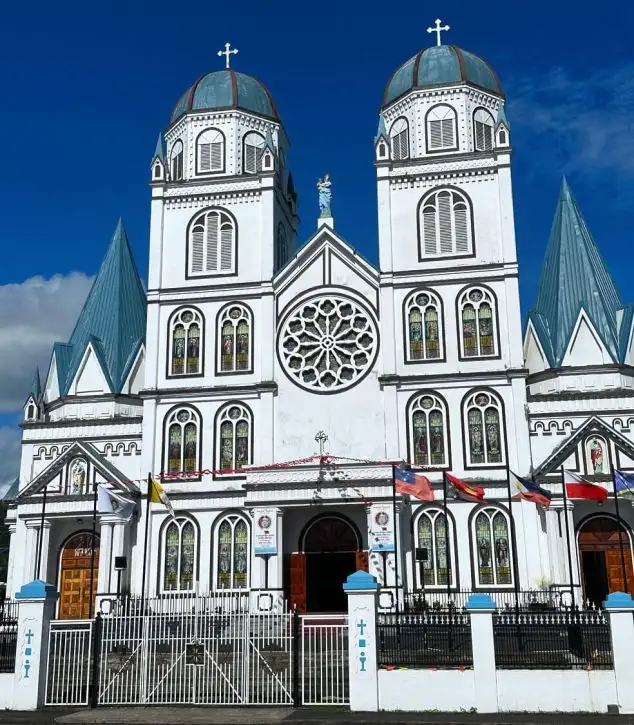
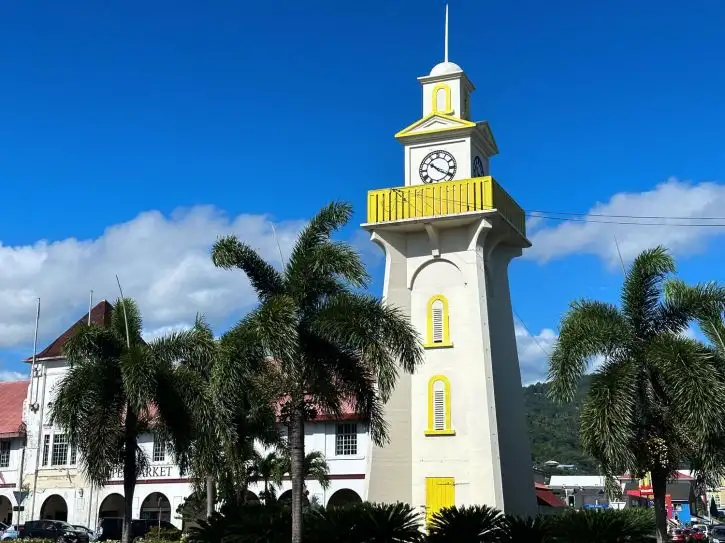
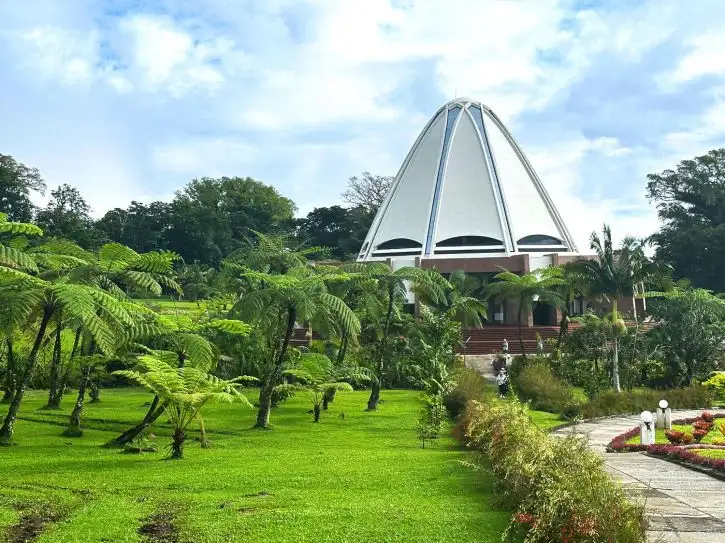
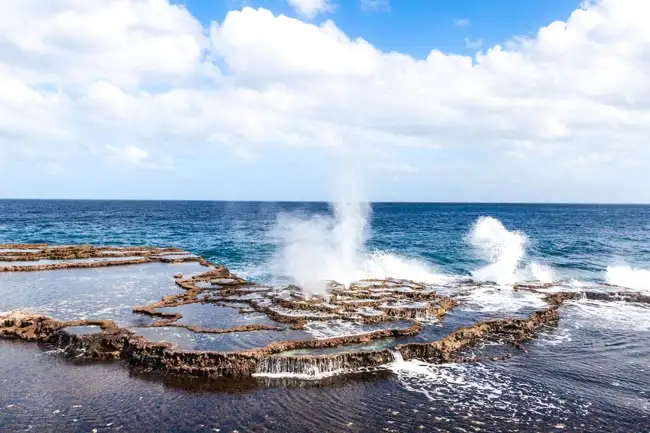
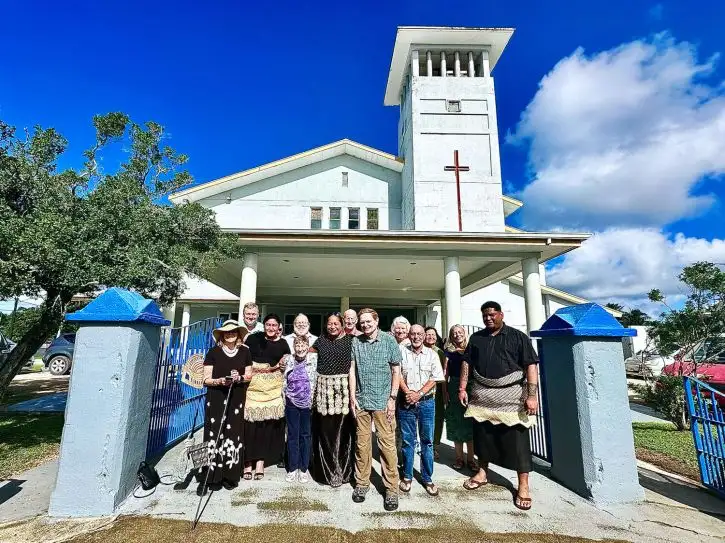
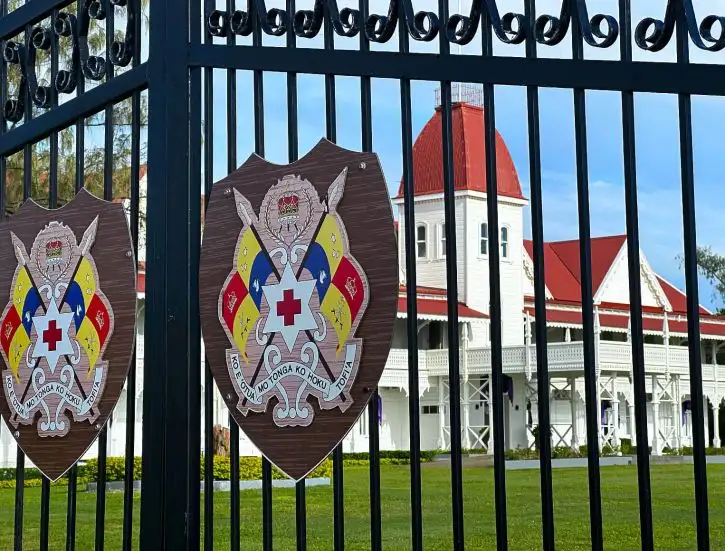
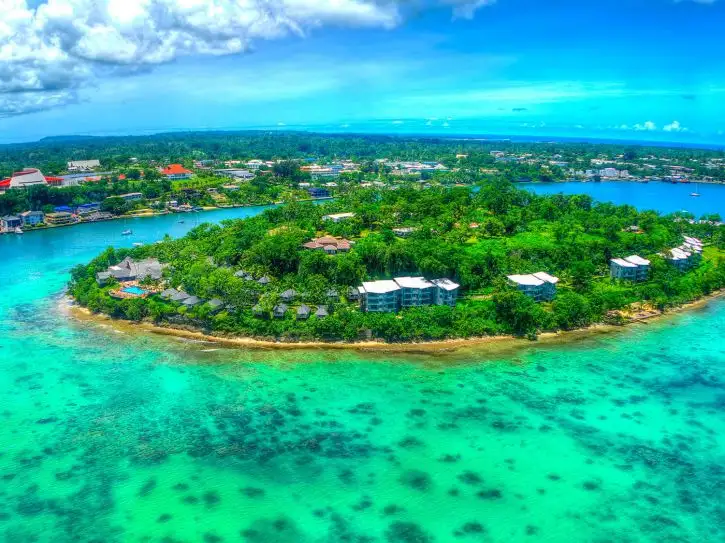
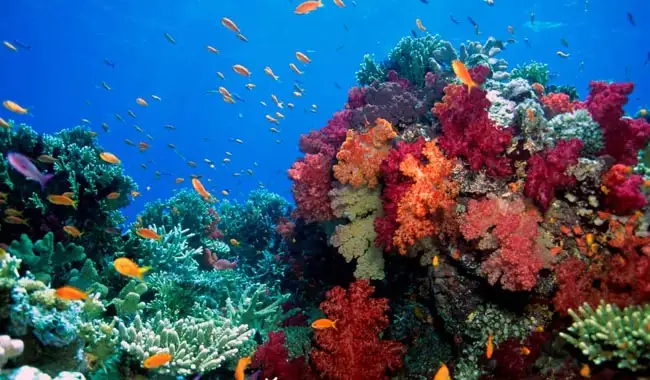
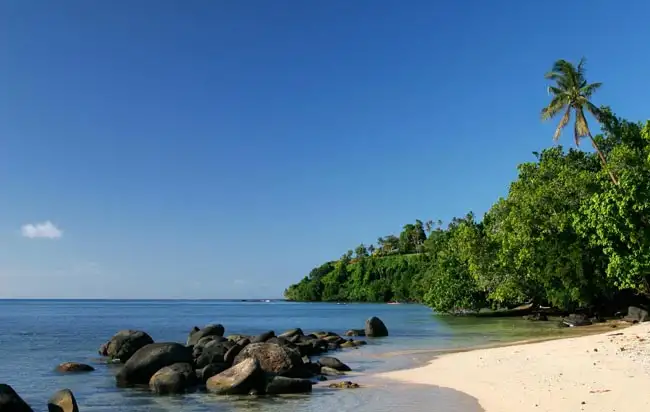
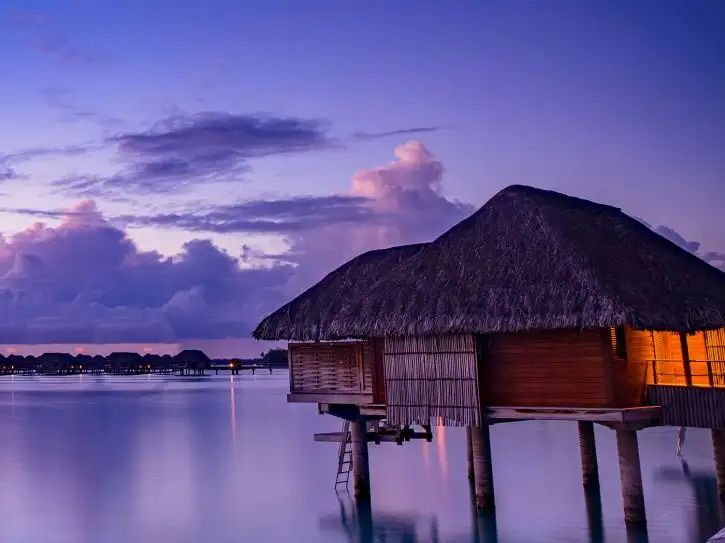
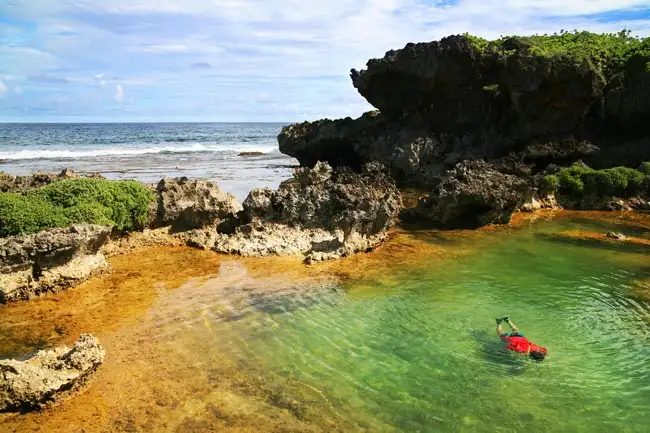
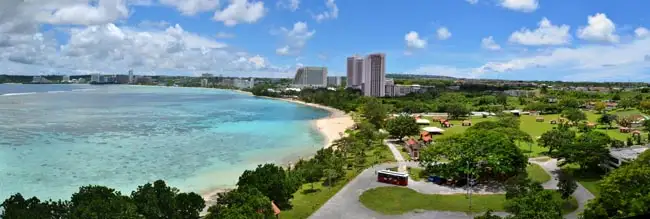
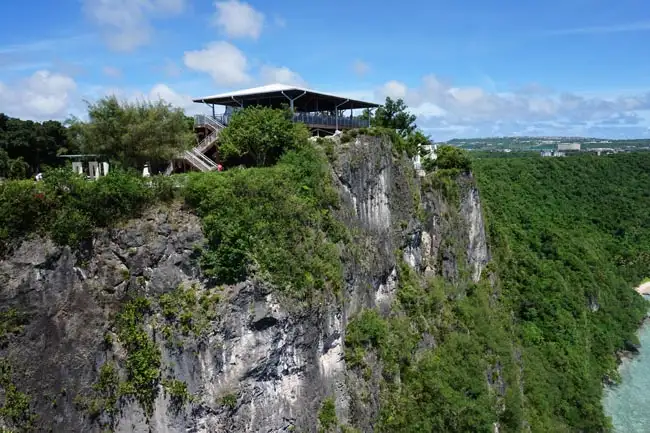
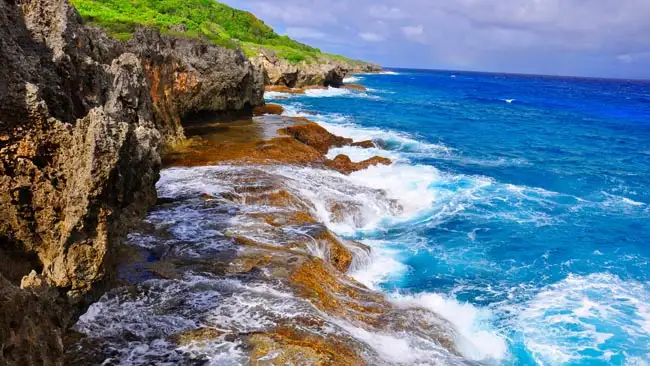
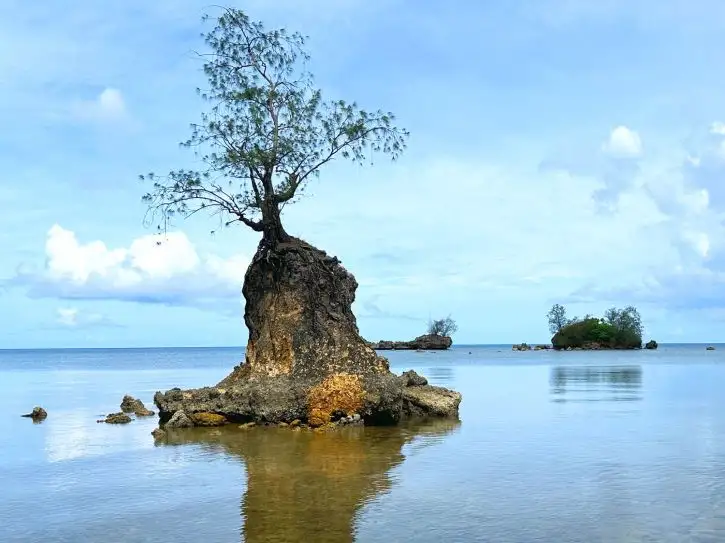
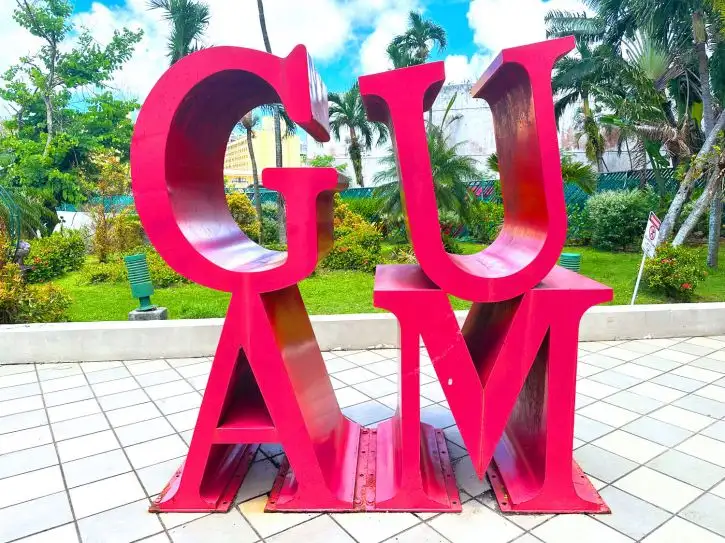
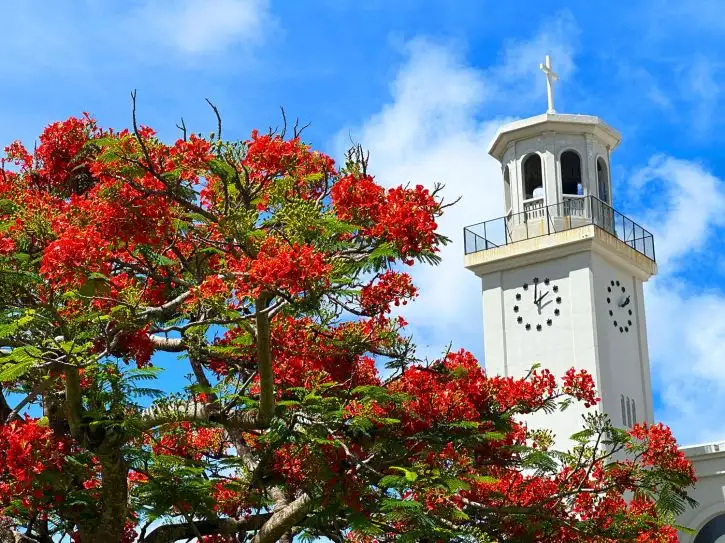
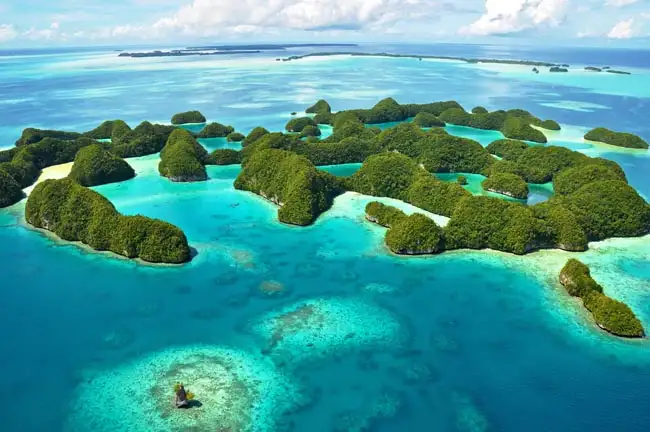
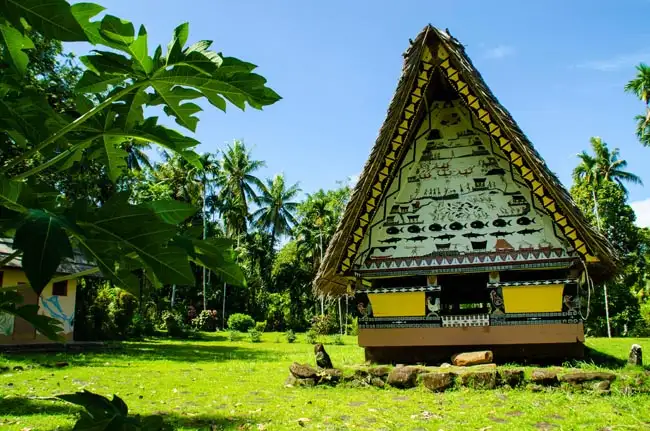
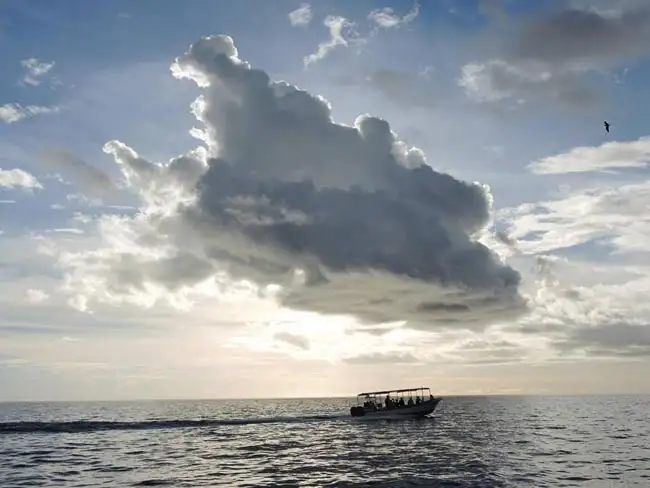
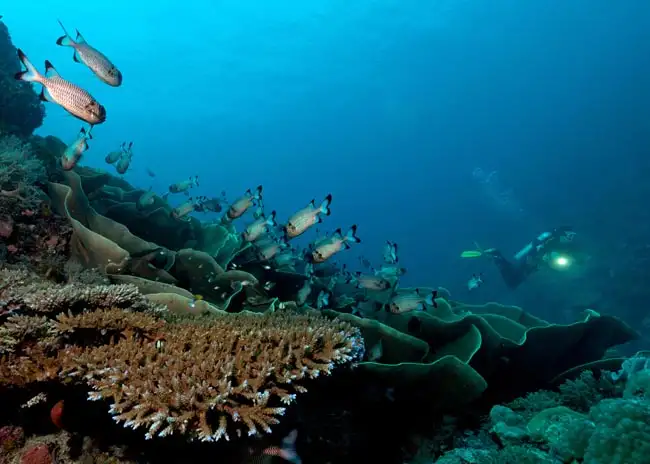
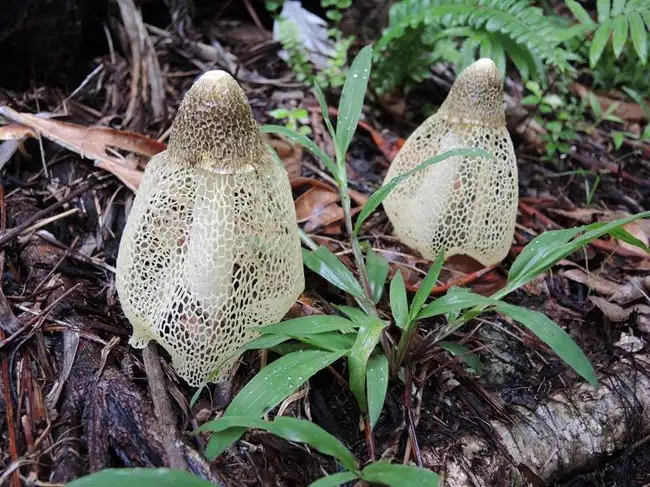
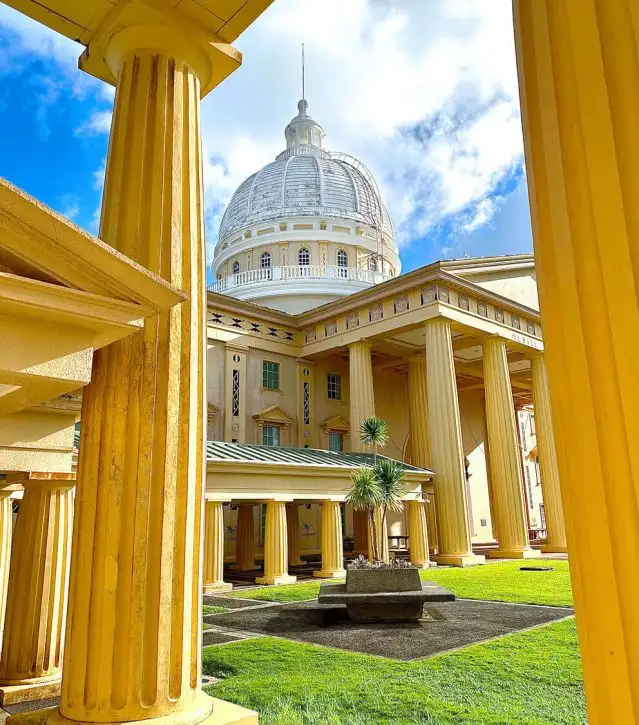
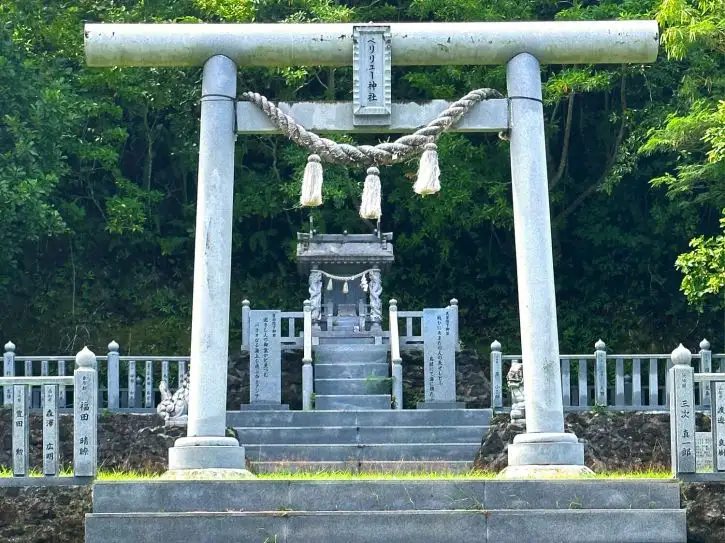
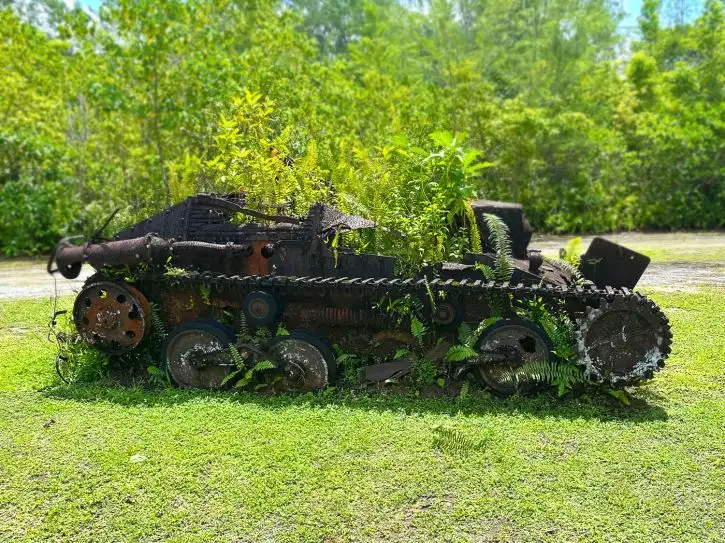
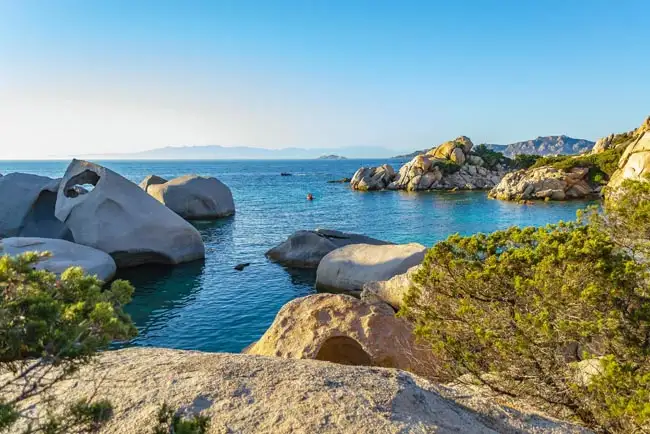
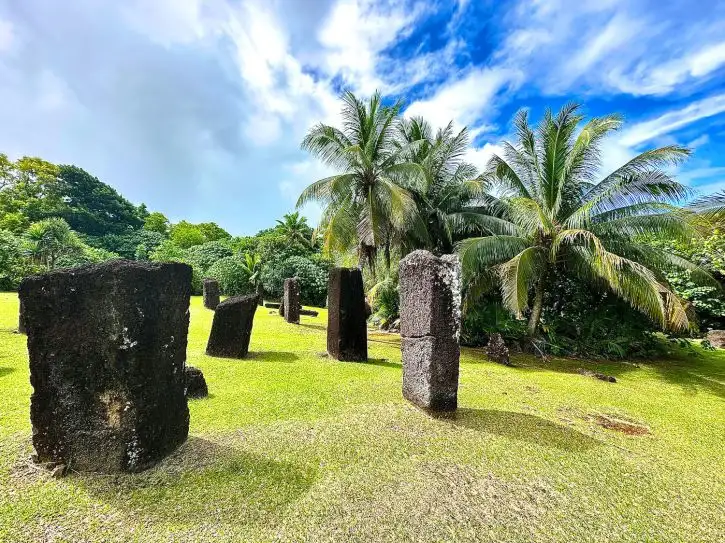
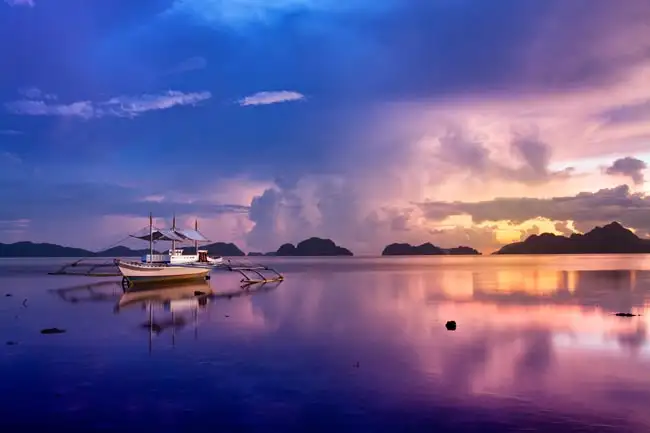
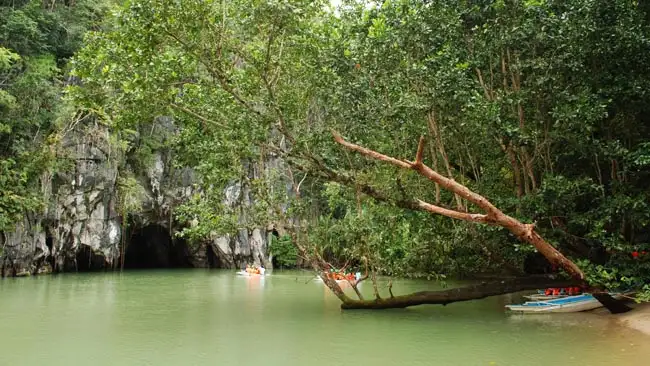
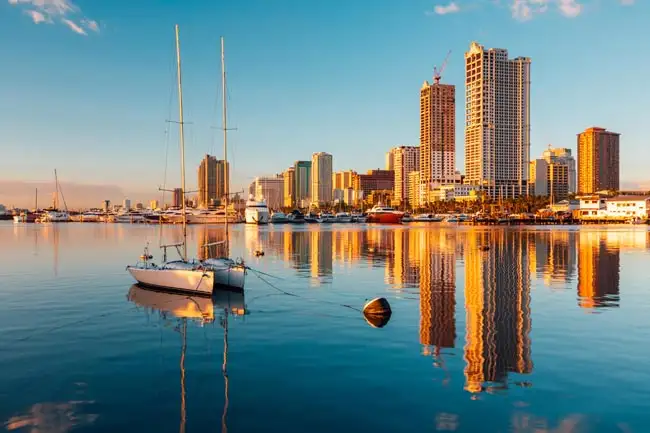
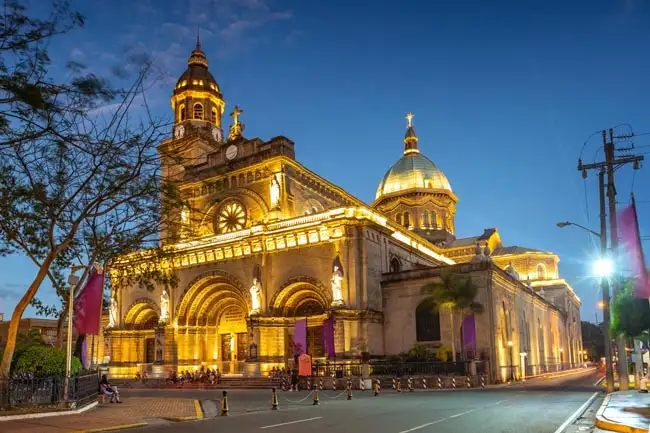
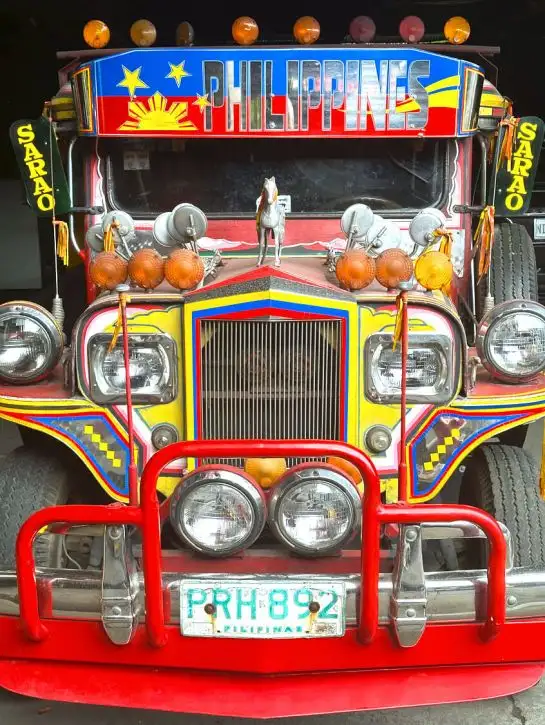
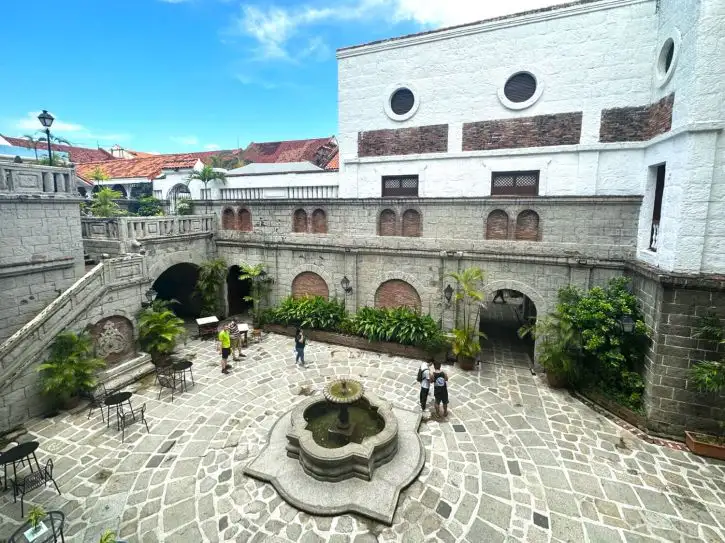
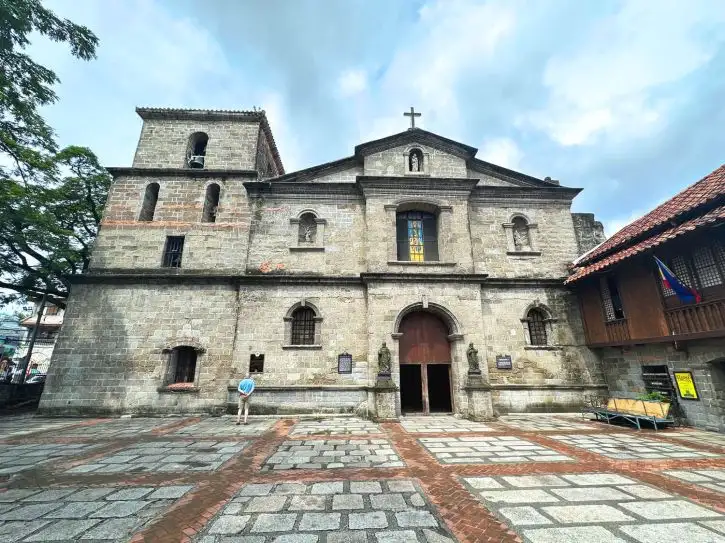
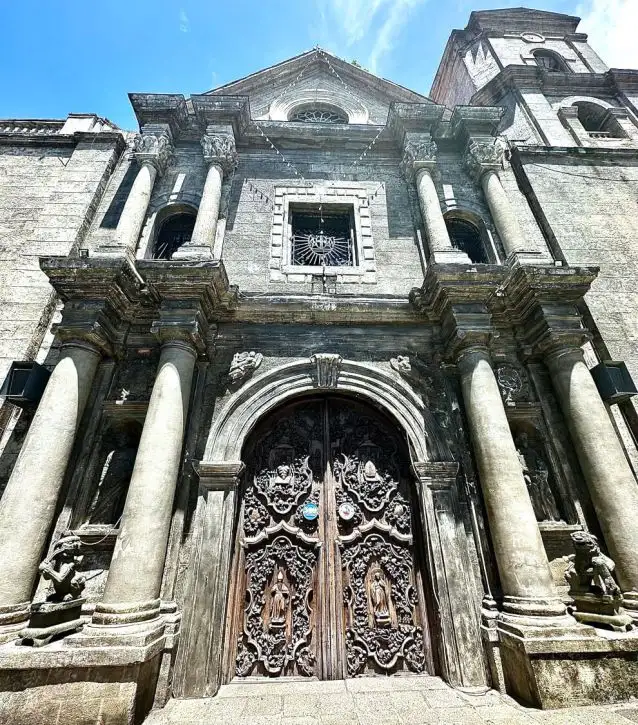
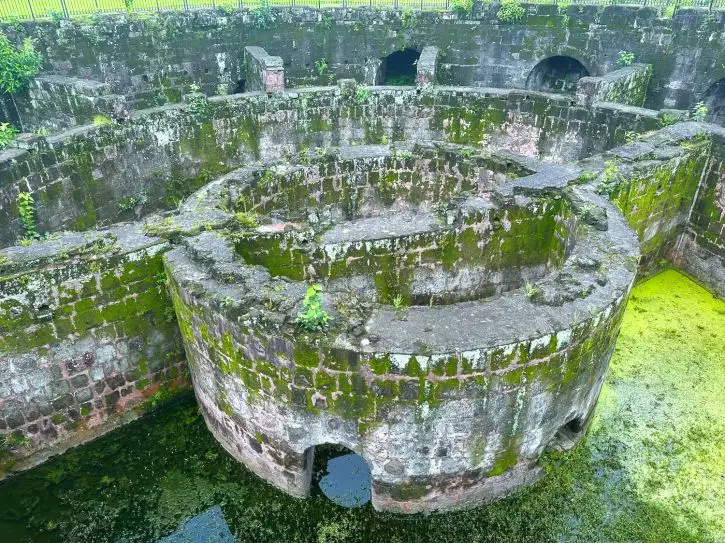
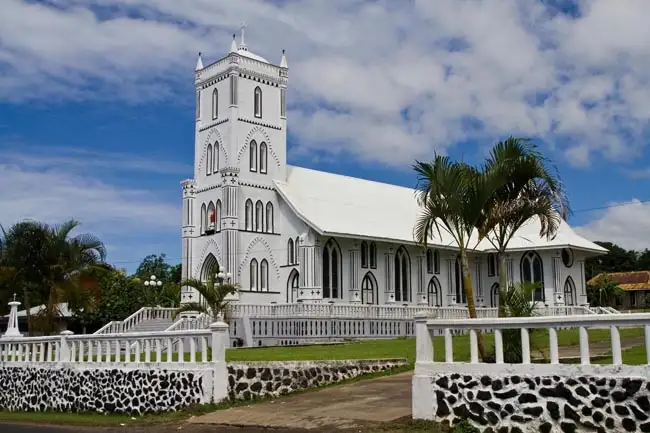
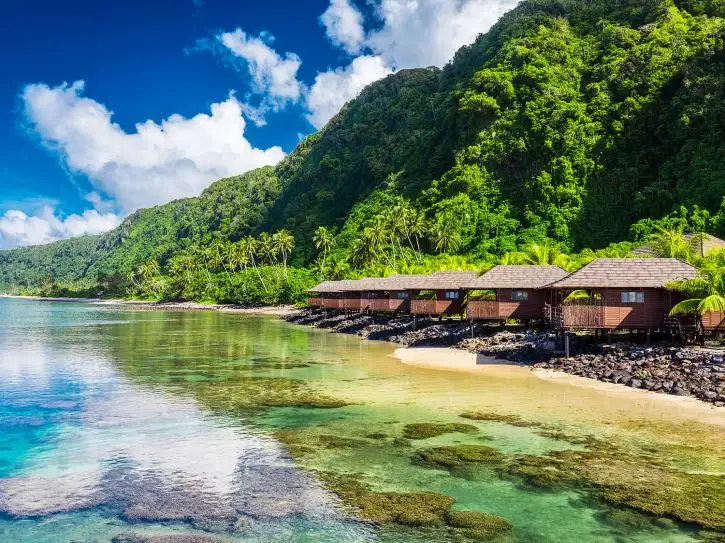
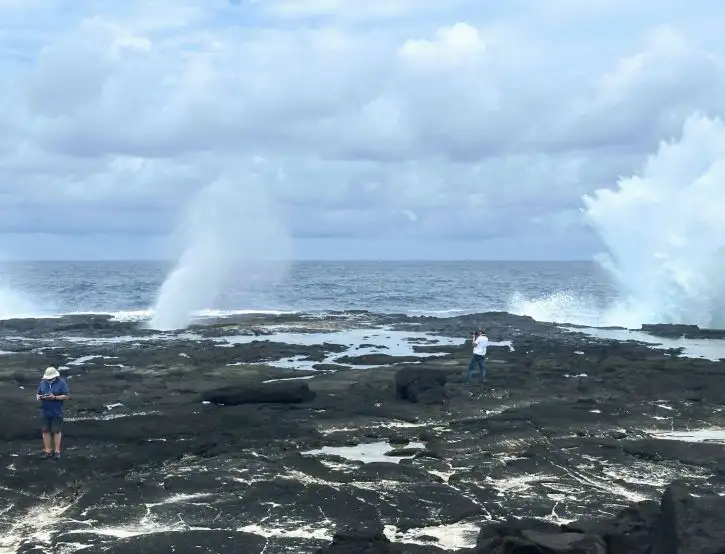
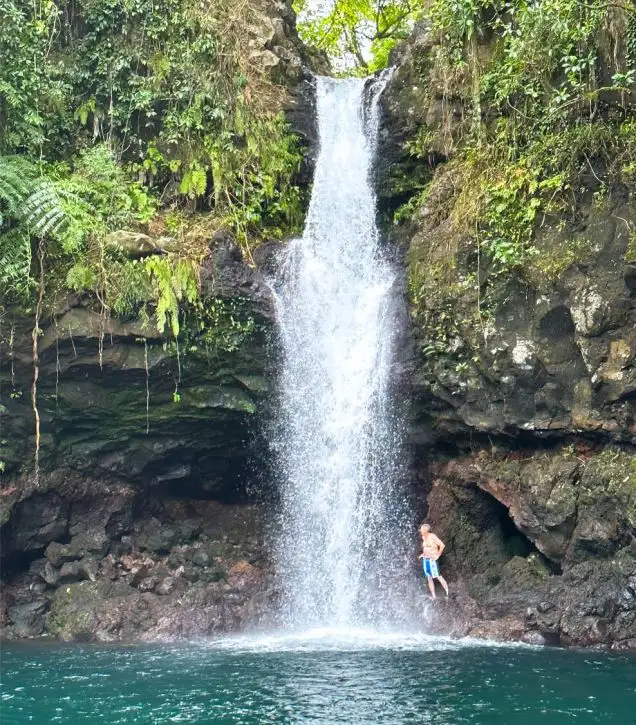
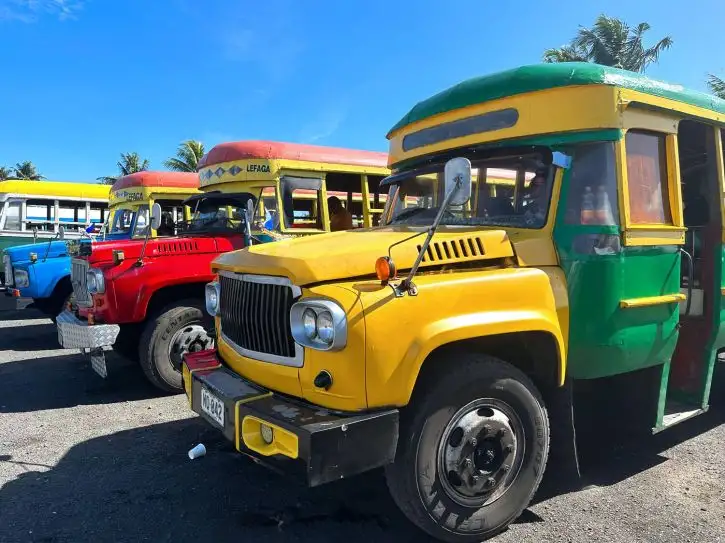
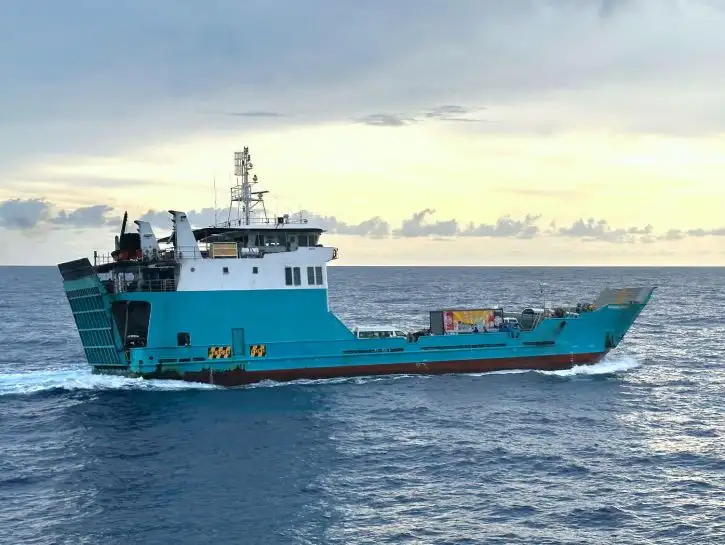
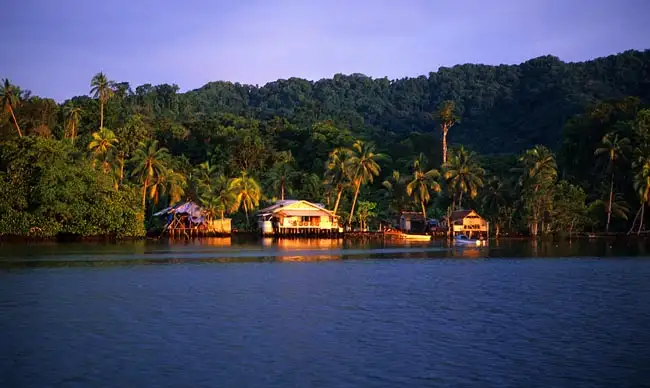
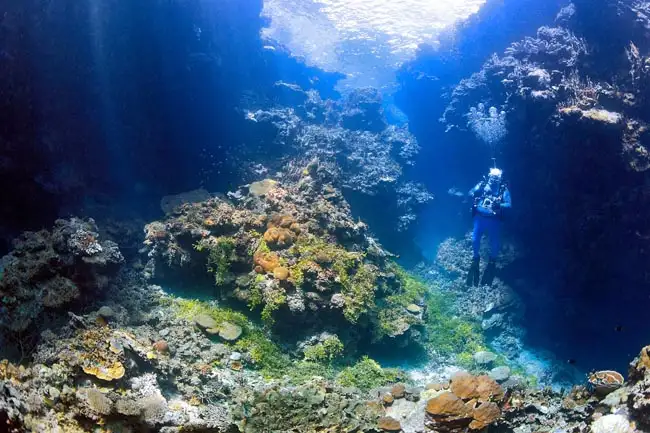
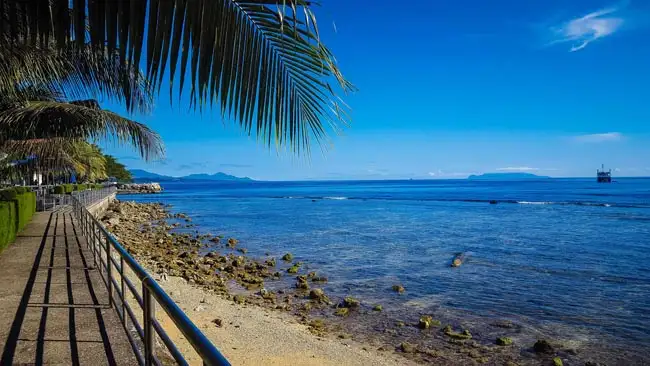
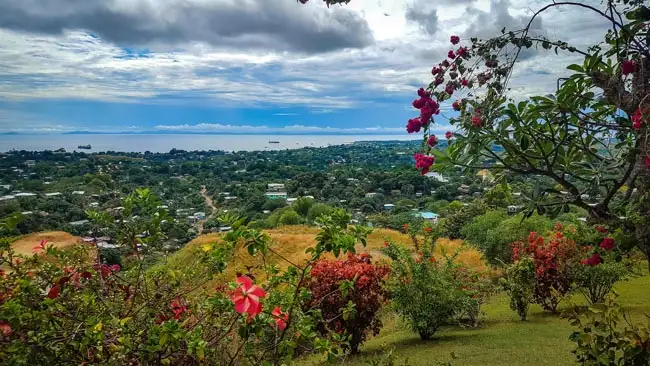
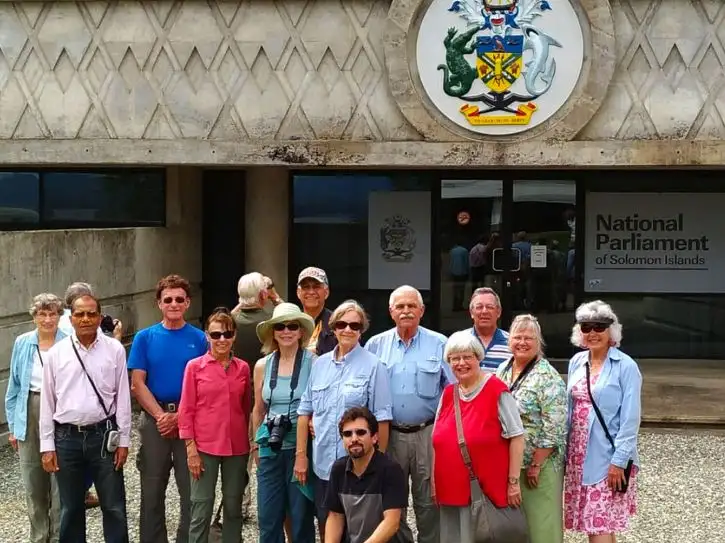
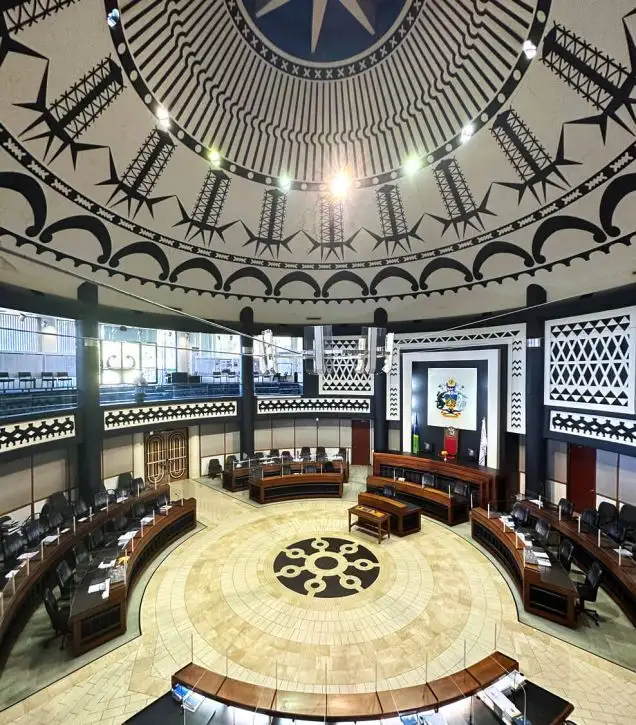
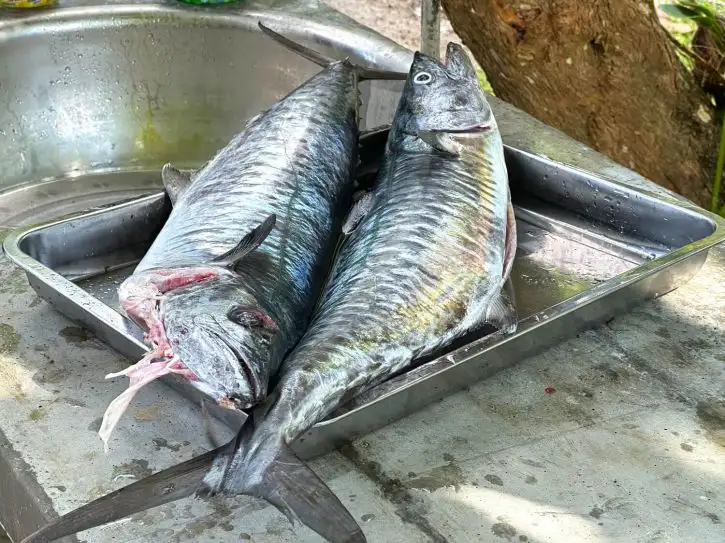
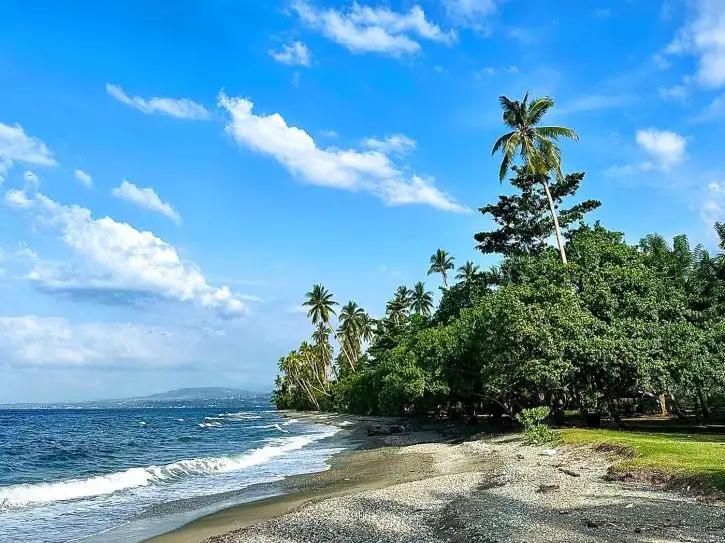
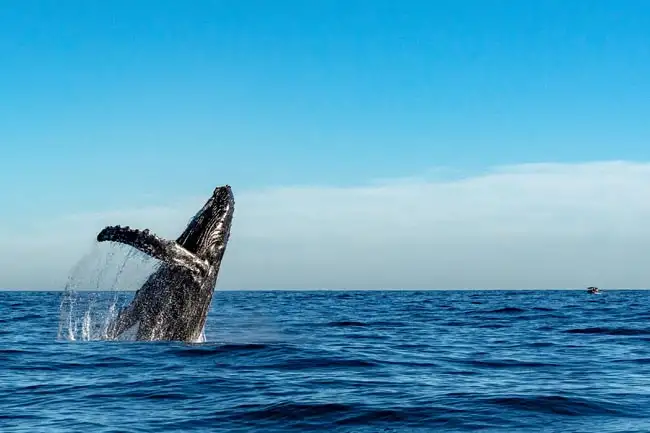
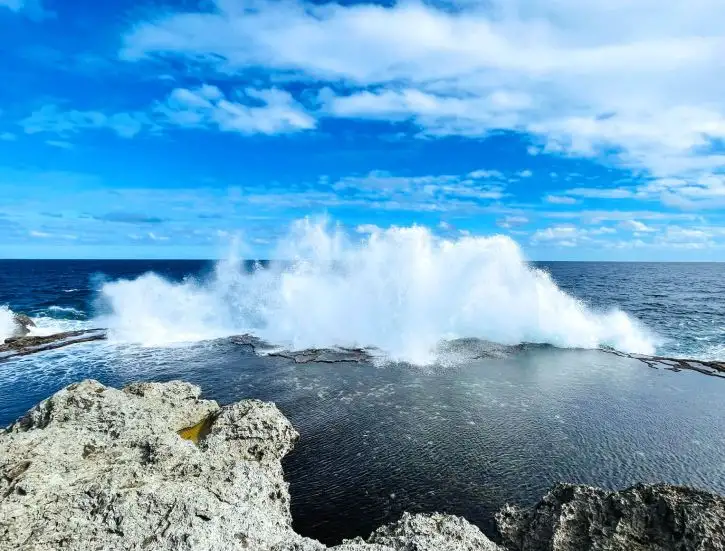
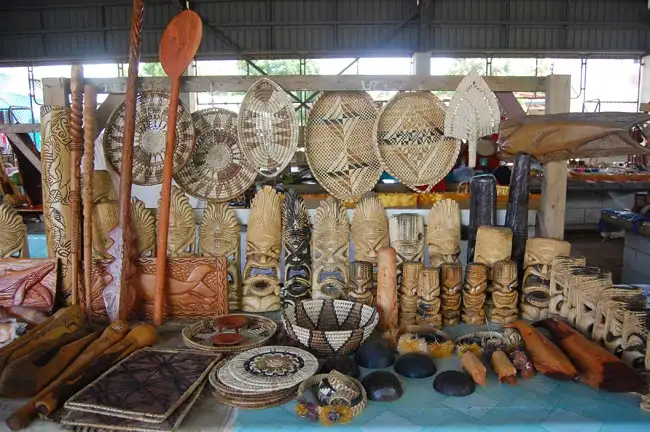
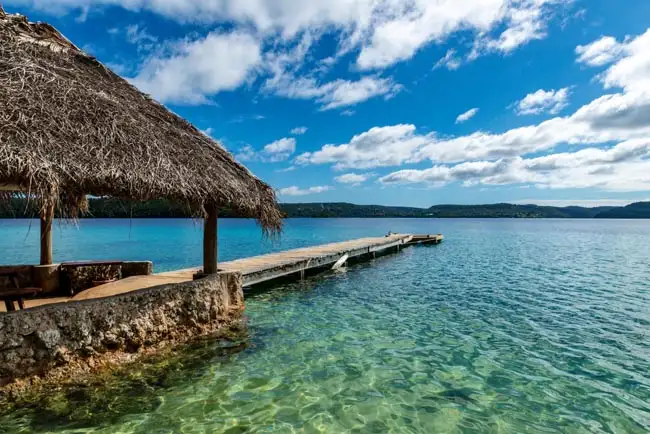
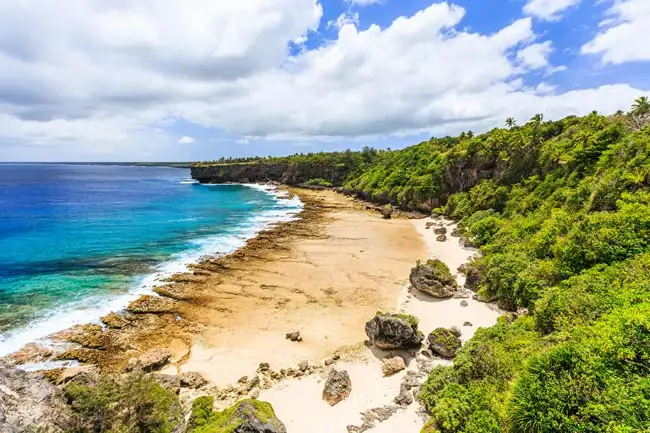
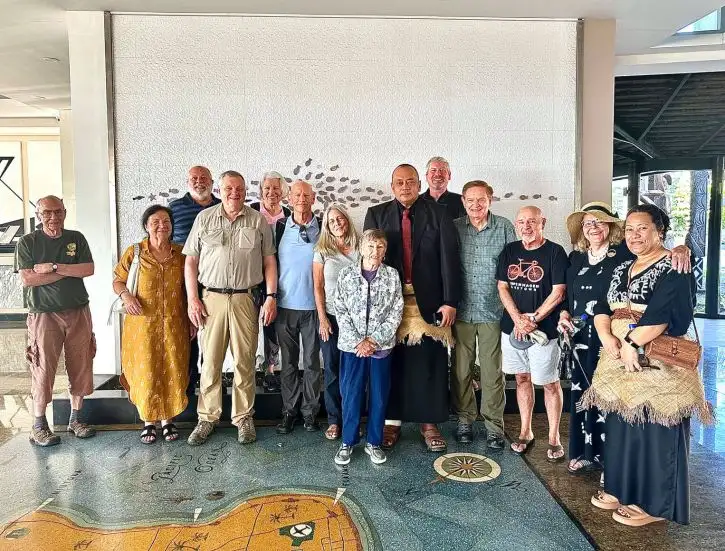
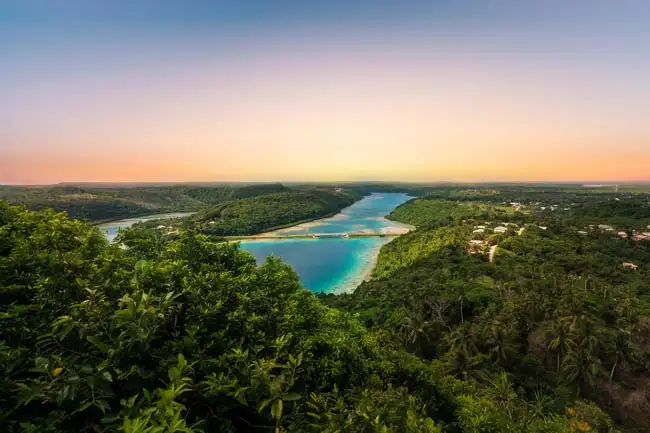
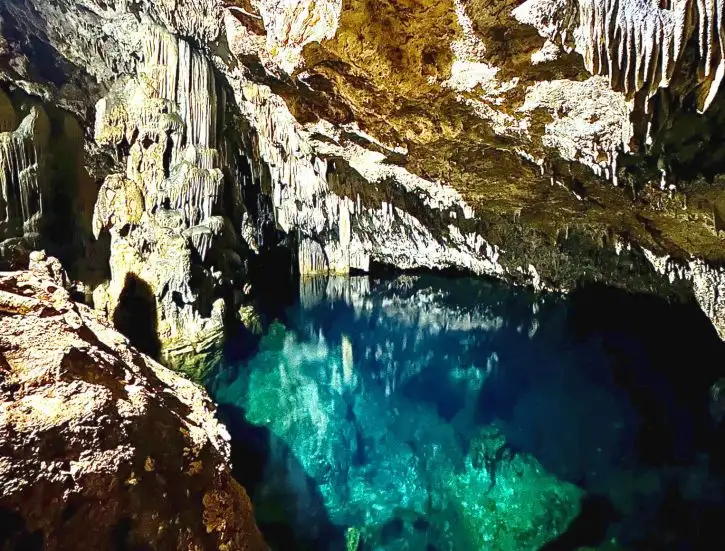
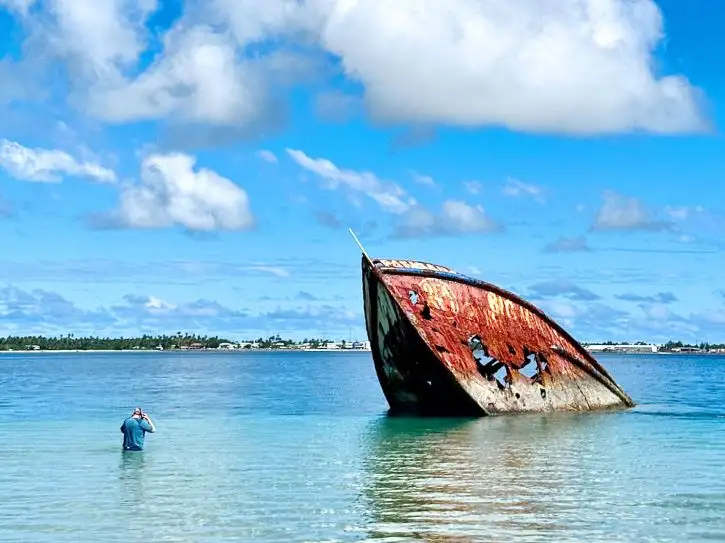
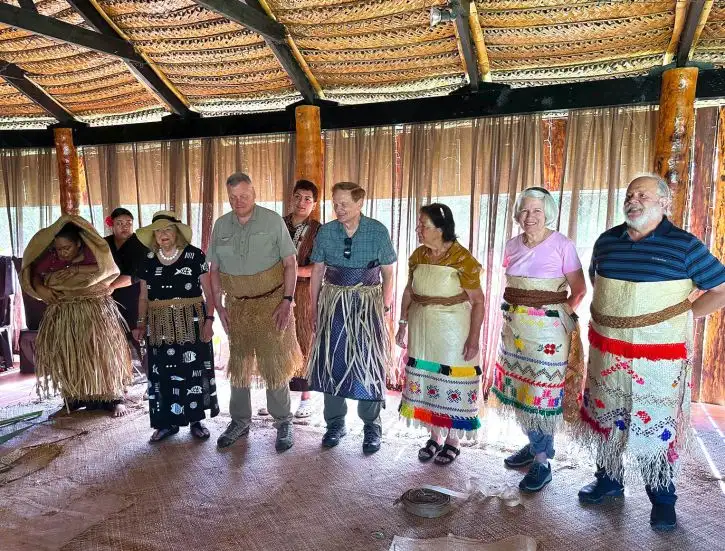
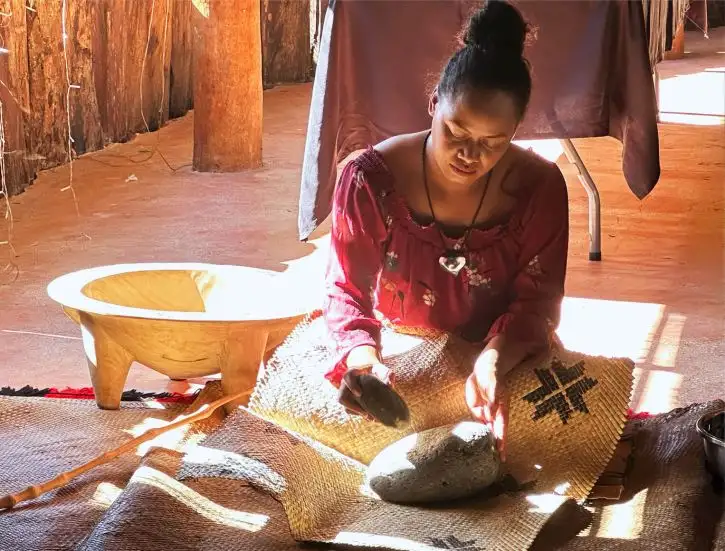
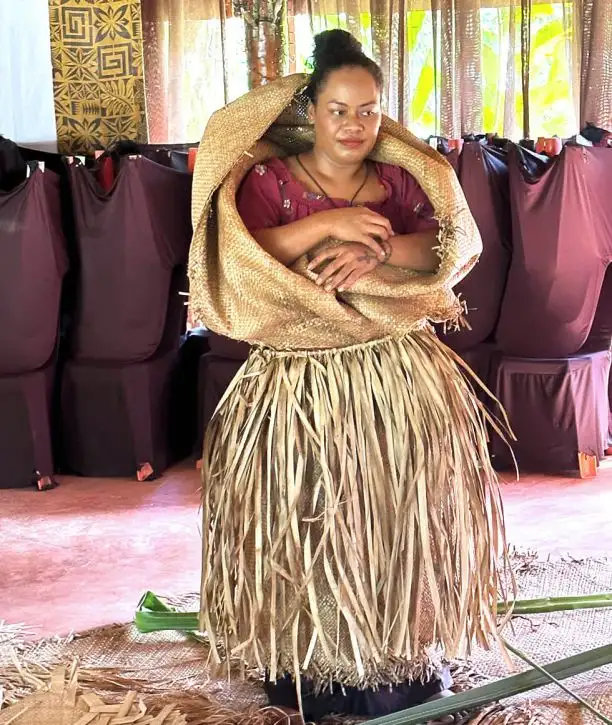
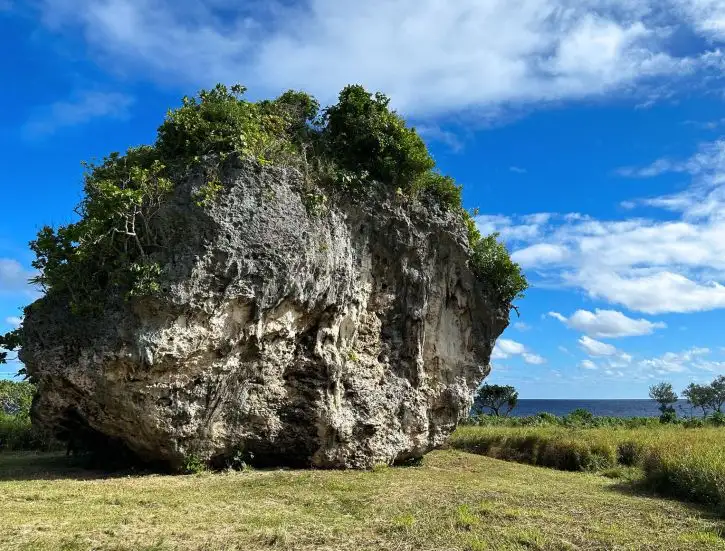
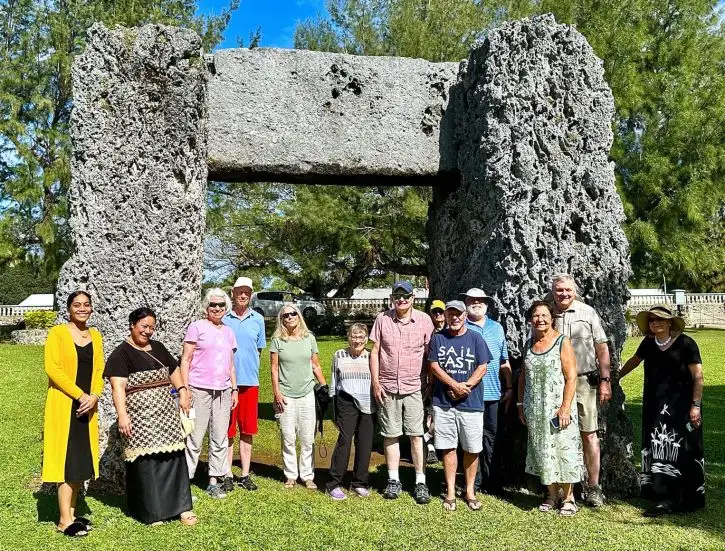
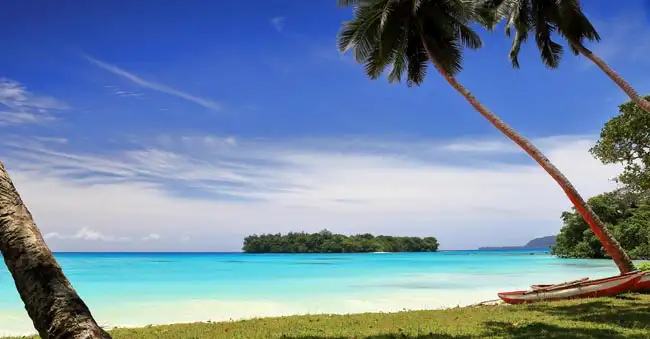
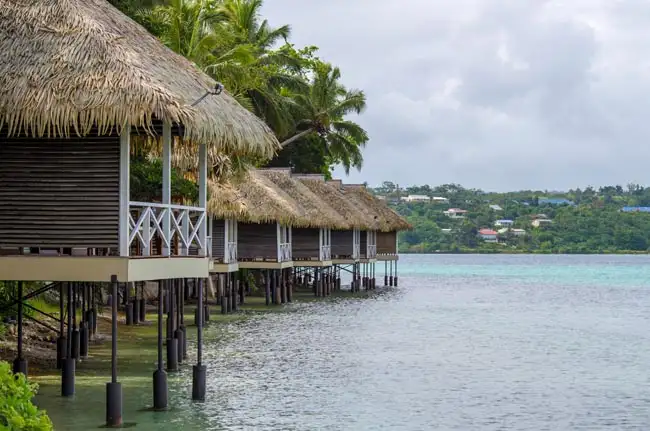
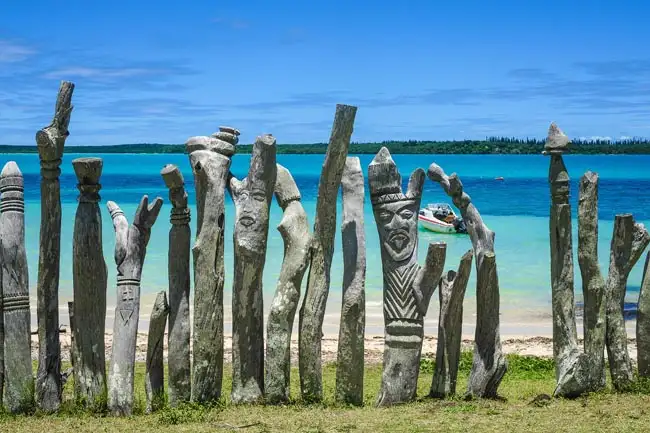
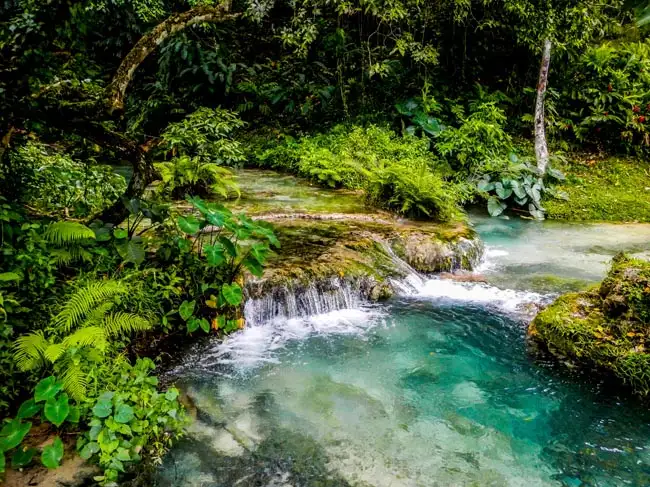
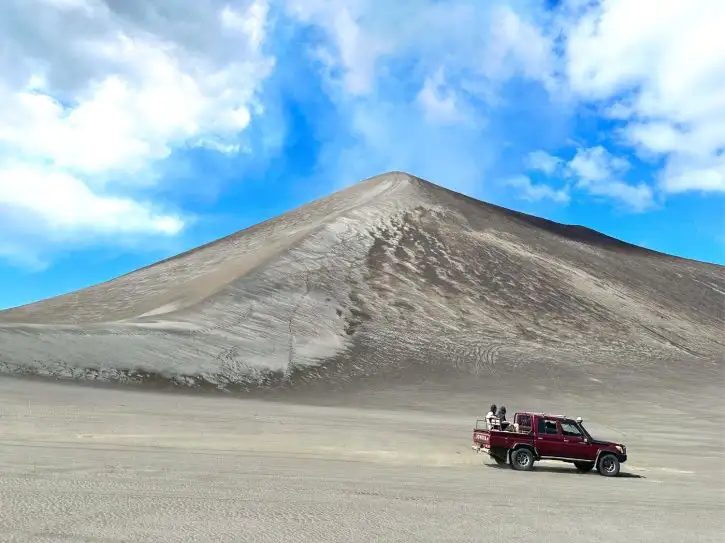
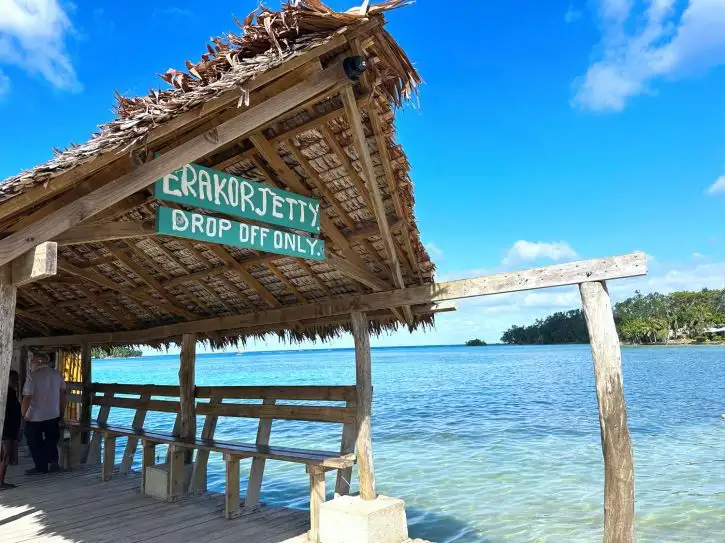
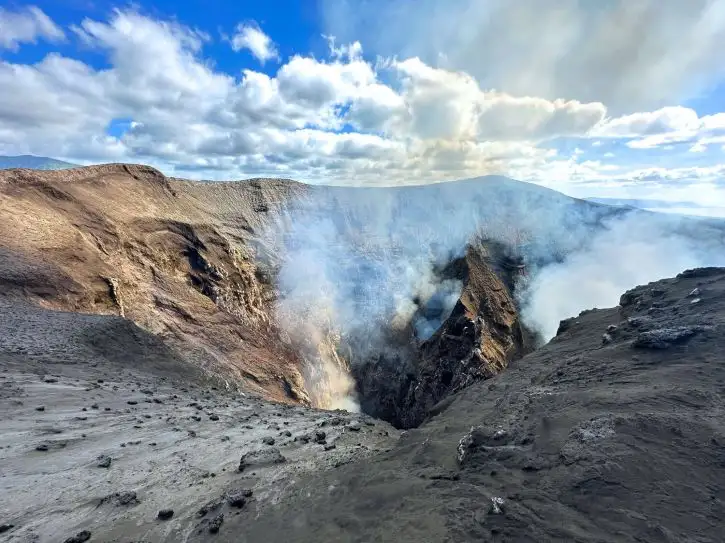
Excellent
Overall Rating
4.6
Extend Your Trip
This tour is part of a series that can be upgraded to make for a longer trip.
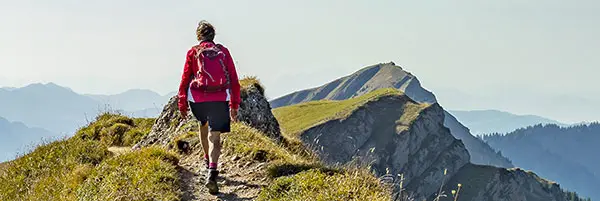
Fast and easy
Book this tour
Book your unforgettable adventure today! For any questions or advice, don't hesitate to contact us.
Have questions?
Contact Us
1-800-665-3998
- Final payment is due days prior to departure.
- A non-refundable $1000 USD deposit is payable at the time of booking
- Optional Single Supplement: $2950 USD (number of singles limited).
This tour may require a mandatory single supplement charge of $2950 USD if you join our share program and we are unable to pair you. - Transferring to another tour or tour date is only permissible outside of 120 days prior to departure and is subject to a $100 USD change fee. (Read our cancellation policy for more info.)
- $1000 DEPOSIT REQUIRED. Please Note: Price includes ALL internal flights exclusive of taxes. Upon 'guarantee,' we will require an additional pre-payment of $2000 per person to cover the internal flights included on the tour. Once paid this amount becomes 100% non-refundable & non-transferrable. Due to variable air schedules, our 2026 dates are TENTATIVE and could shift slightly.
Prices below are per person, twin-sharing costs in US Dollars (USD). Pricing does not include airfare to/from the tour and any applicable taxes. Get general information on flights to/from the tour.
Choose your departure date:
Frequently Asked Questions
- What is the maximum number of participants on a trip?Most of our tours carry a maximum of 18 participants; some tours (ie hiking tours) top out at 16. In the event that we do not achieve our minimum complement by our 90-day deadline, we may offer group members the option of paying a "small-group surcharge" as an alternative to cancellation. If all group members agree, we will confirm the trip at existing numbers; this surcharge is refundable in the event that we ultimately achieve our regular minimum. If the small group surcharge is not accepted, we will offer a refund of your deposit or a different trip of your choice.
- Can I extend my tour either at the beginning or end? What about stopovers?Yes, you can extend your tour either at the beginning or the end and we can book accommodation in our tour hotel. Stopovers are often permitted, depending on air routing. Stopovers usually carry a "stopover" fee levied by the airline.
- How do I make a reservation? How and when do I pay?The easiest way to make a reservation is via our website; during office hours, you are also more than welcome to contact us by telephone.
A non-refundable deposit is payable at the time of booking; if a reservation is made within 90 days, full payment is required. Some trips require a larger deposit. If international airline bookings require a non-refundable payment in order to secure space or the lowest available fare, we will require an increase in deposit equal to the cost of the ticket(s).
Early enrolment is always encouraged as group size is limited and some trips require greater preparation time.
Once we have received your deposit, we will confirm your space and send you a confirmation package containing your trip itinerary, any visa/travel permit related documents, invoice, clothing and equipment recommendations, general information on your destination(s), and forms for you to complete, sign and return to us. Your air e-tickets (if applicable), final hotel list, final trip itinerary, and instructions on how to join your tour, will be sent approximately 2-3 weeks prior to departure. - What about cancellations, refunds, and transfers?Please review our cancellation policy page for details.
- I am a single who prefers my own room. What is a single supplement?All of our tours have a single supplement for those who want to be guaranteed their own room at each location.
This supplement is a reflection of the fact that most hotels around the world do not discount the regular twin-share rate for a room by 50% for only one person occupying a room. Most hotels will give a break on the price, but usually in the range of 25-30% of the twin-share rate. This difference, multiplied by each night, amounts to the single supplement.
The conventional amount can also vary from country to country and some destinations are more expensive than others for single occupancy. In order to be "single friendly," the supplements we apply are not a profit centre for us and we do our best to keep them as reasonable as possible.
On most tours we limit the number of singles available, not to be punitive, but rather because many hotels allow for only a limited number of singles; some smaller hotels at remote locations also have a limited number of single rooms available.
Please note that most single rooms around the world are smaller than twin-share rooms and will likely have only one bed. - Do you have a shared accommodation program?Yes! If you are single traveller and are willing to share, we will do our best to pair you with a same-gender roommate. On most of our tours, if we fail to pair you, we will absorb the single supplement fee and you will default to a single room at no extra charge. At some destinations, however, where single rooms are not significantly discounted, or not at all, we may apply a "mandatory" single in the event that we cannot find you a share partner. This is usually 50% of the usual supplement, but can be as much as 100%. If applicable, this proviso will be noted on each tour page on this website, on your invoice, and in our tour date/price book (available for download under "Resources").
Please choose a departure date!
